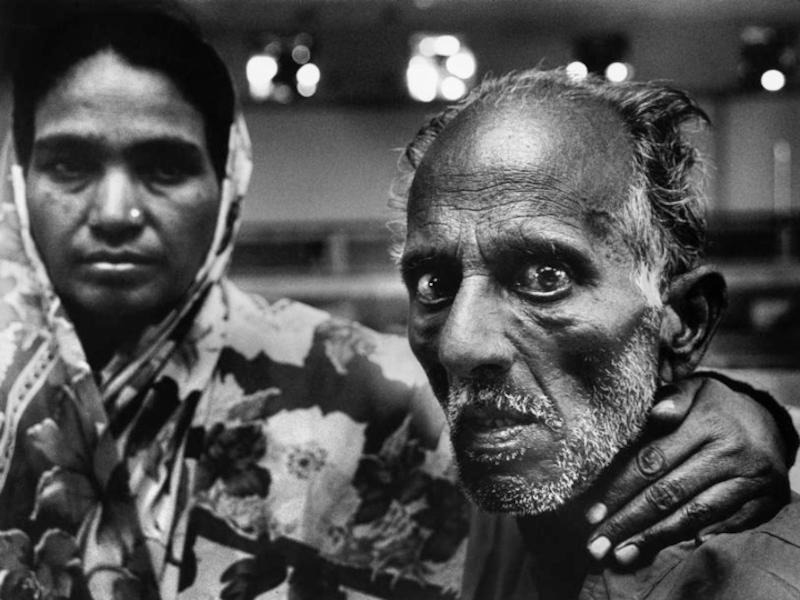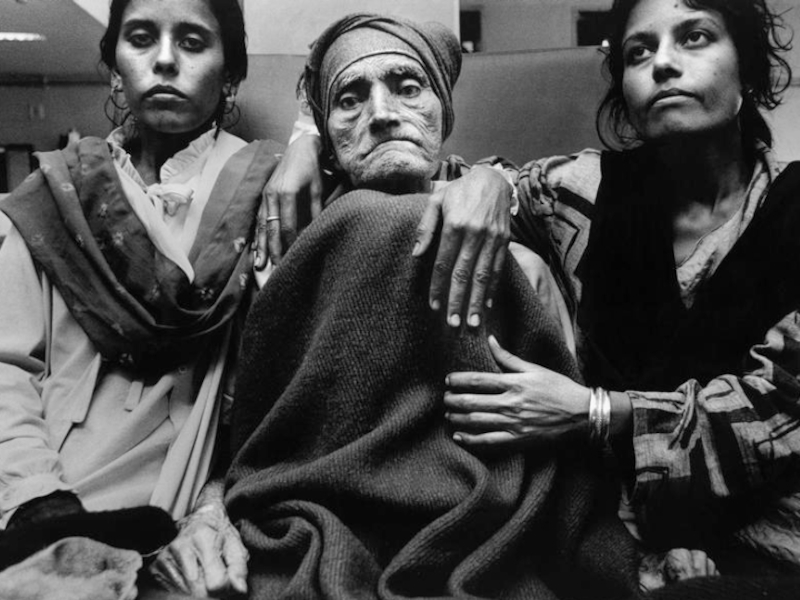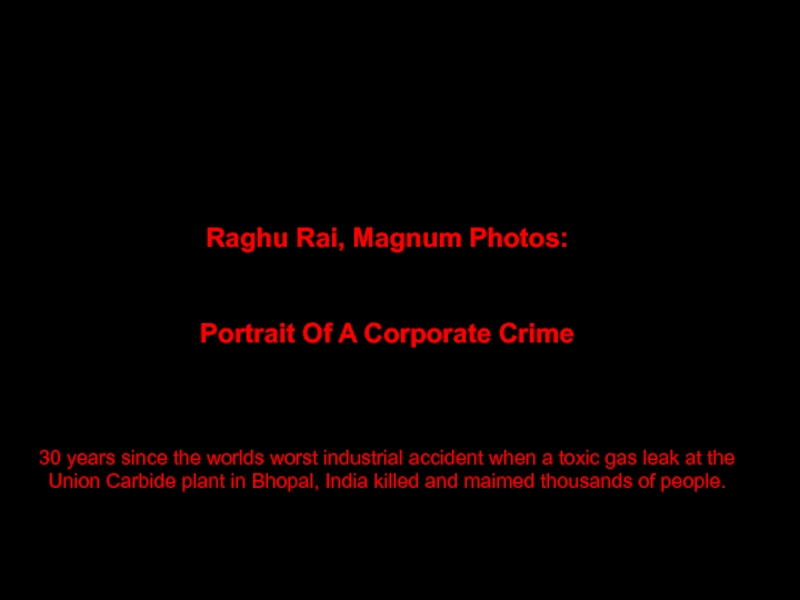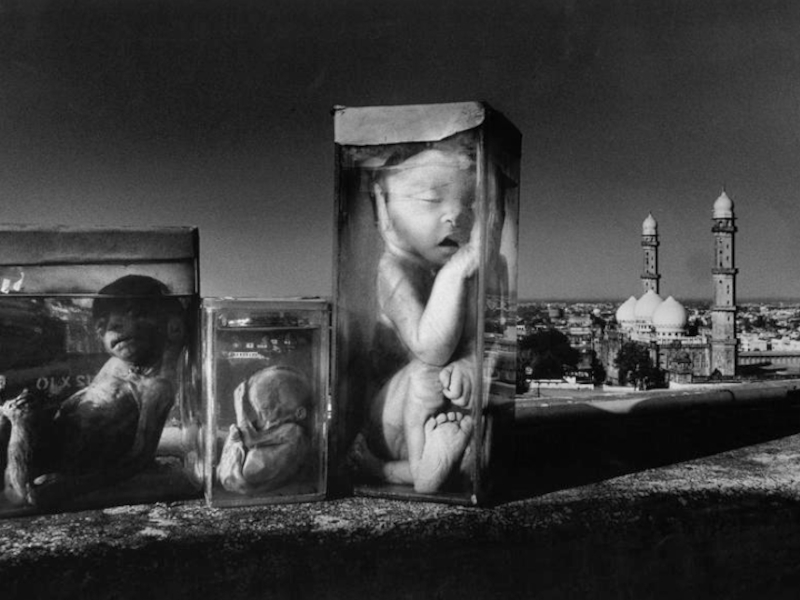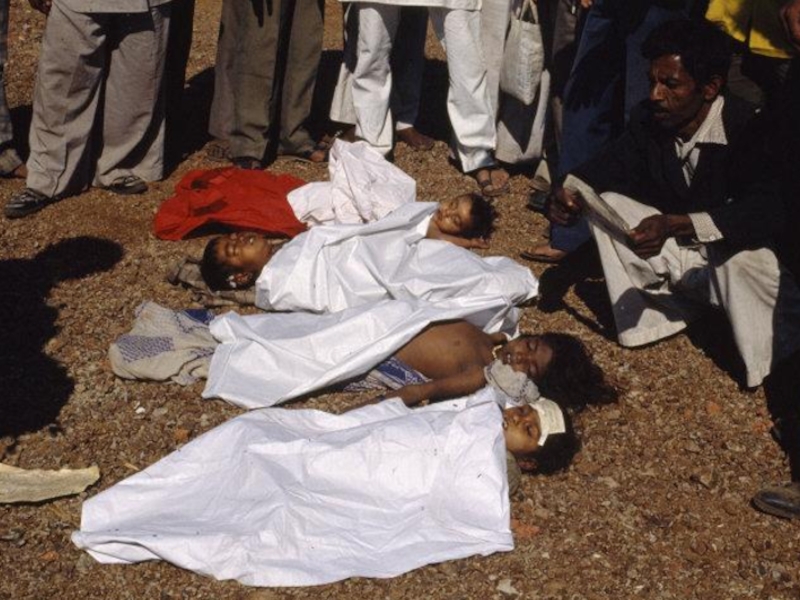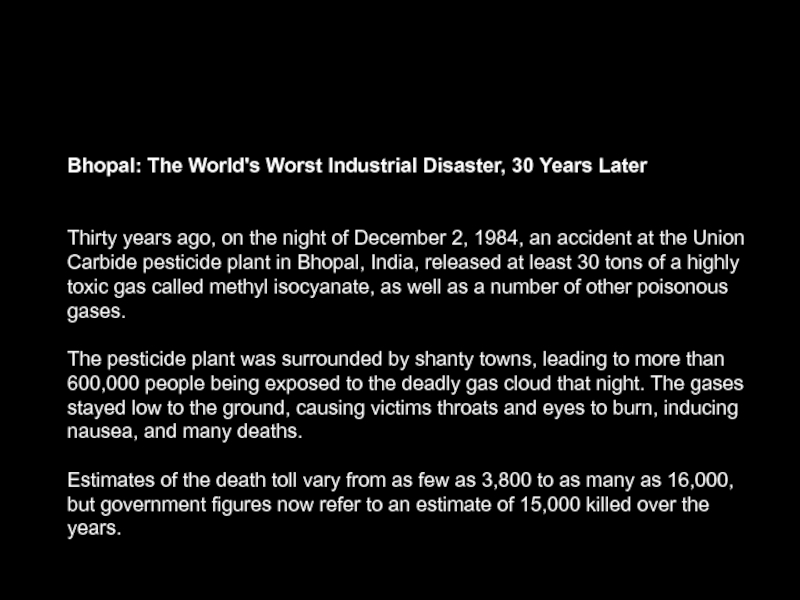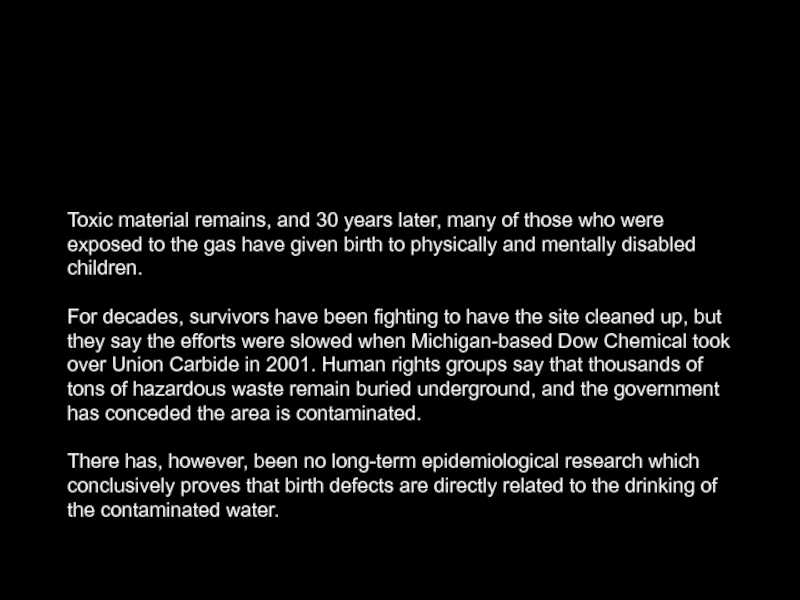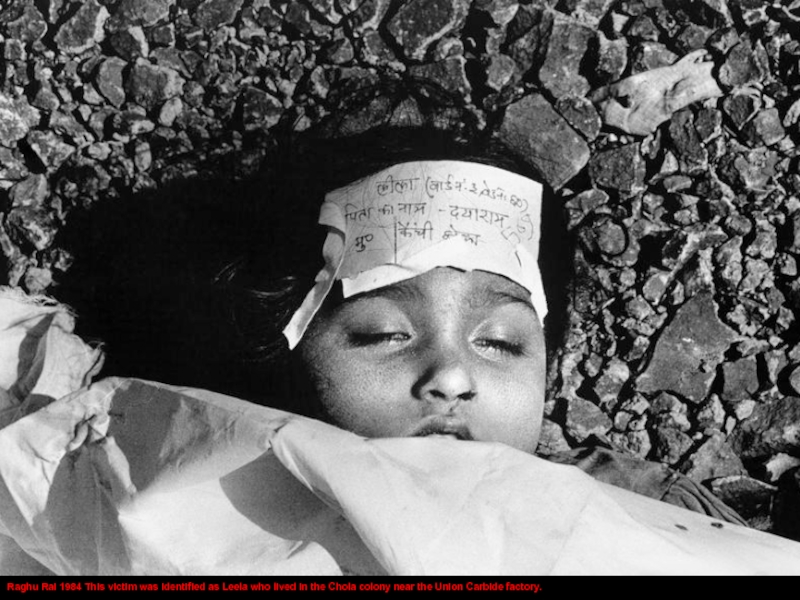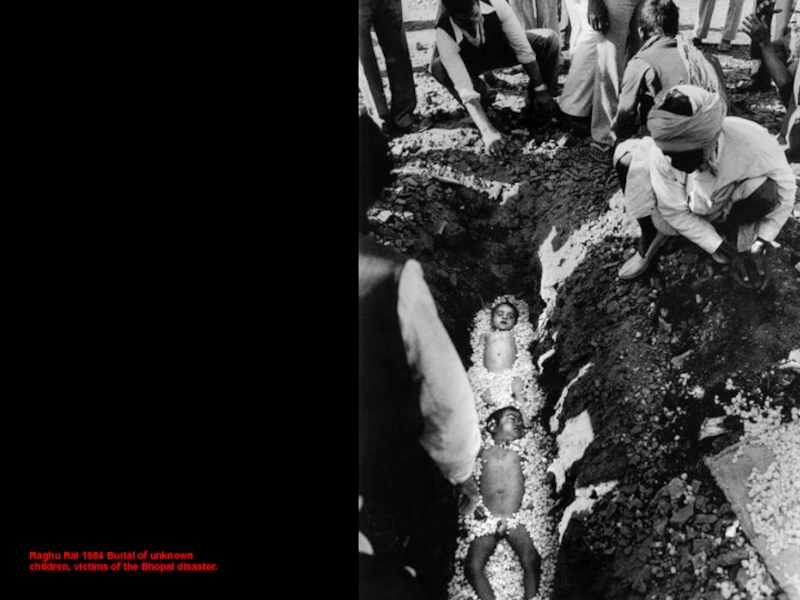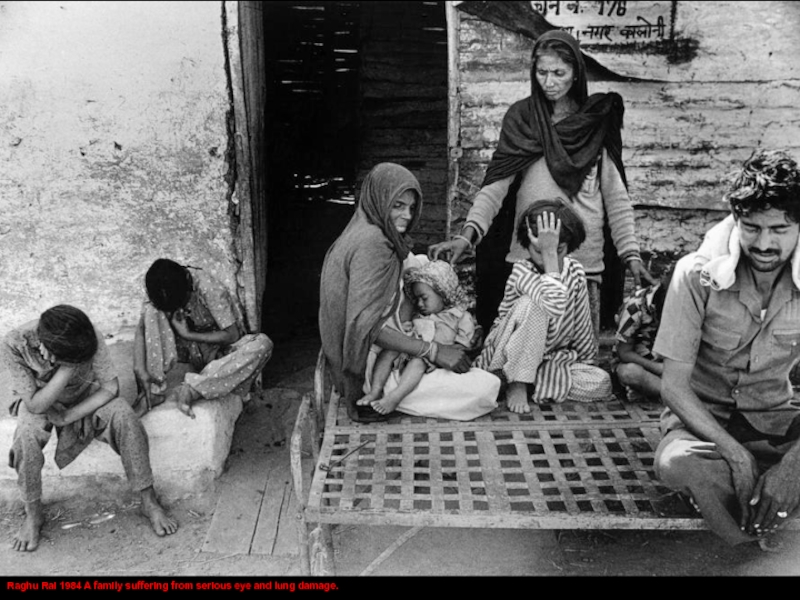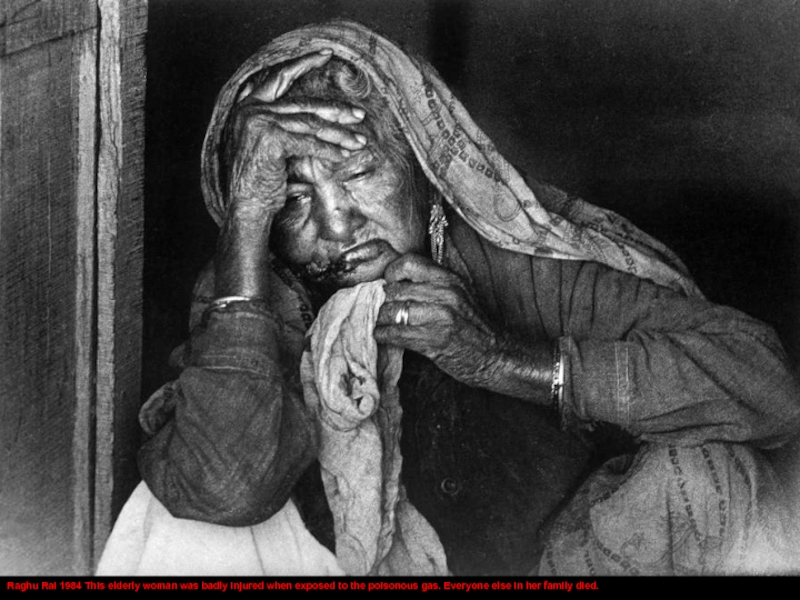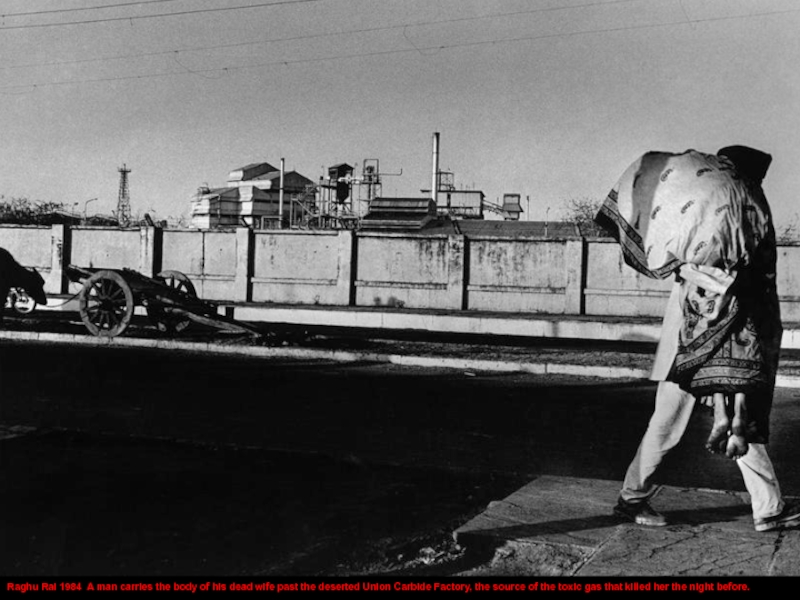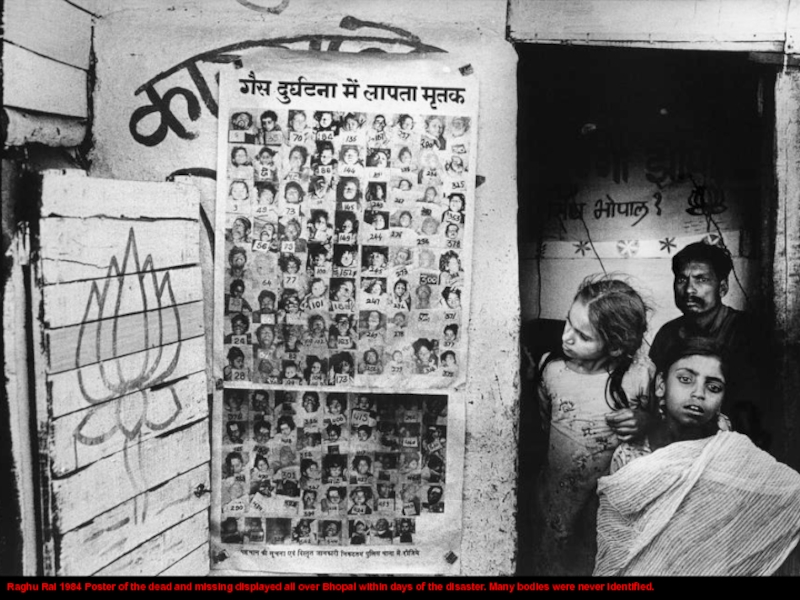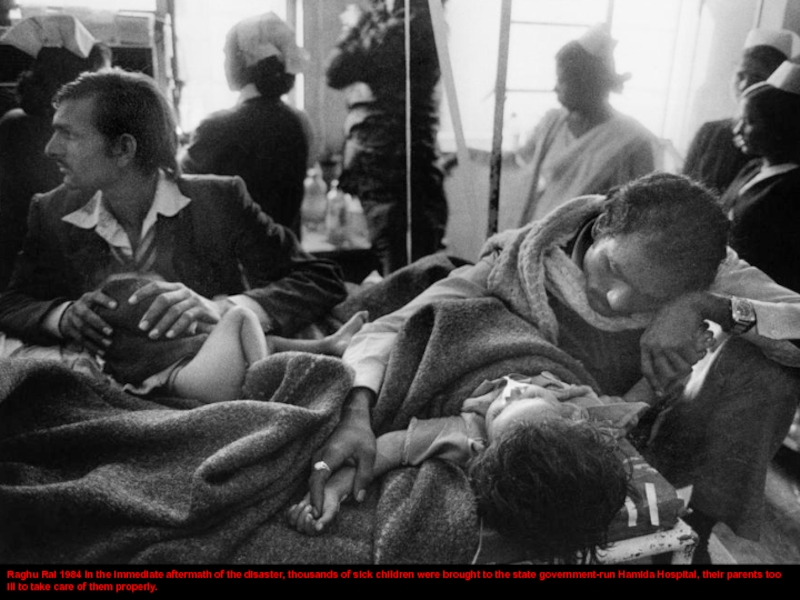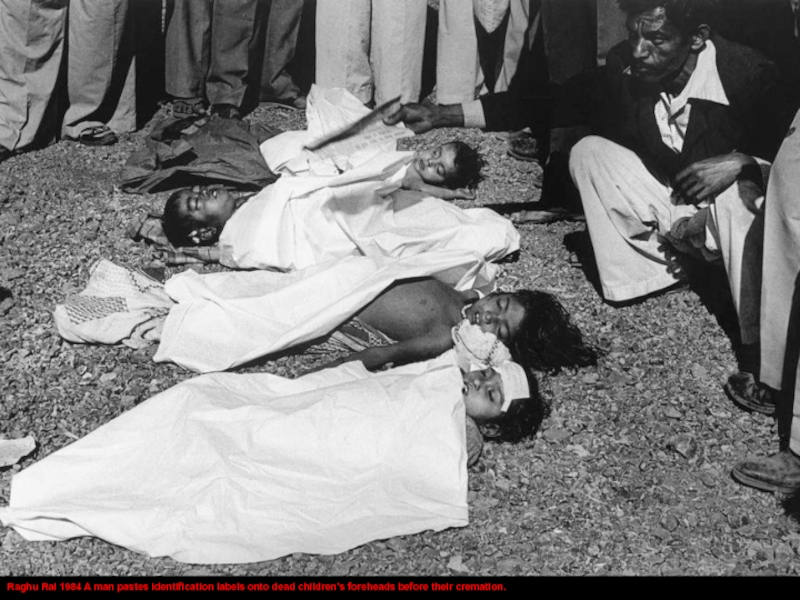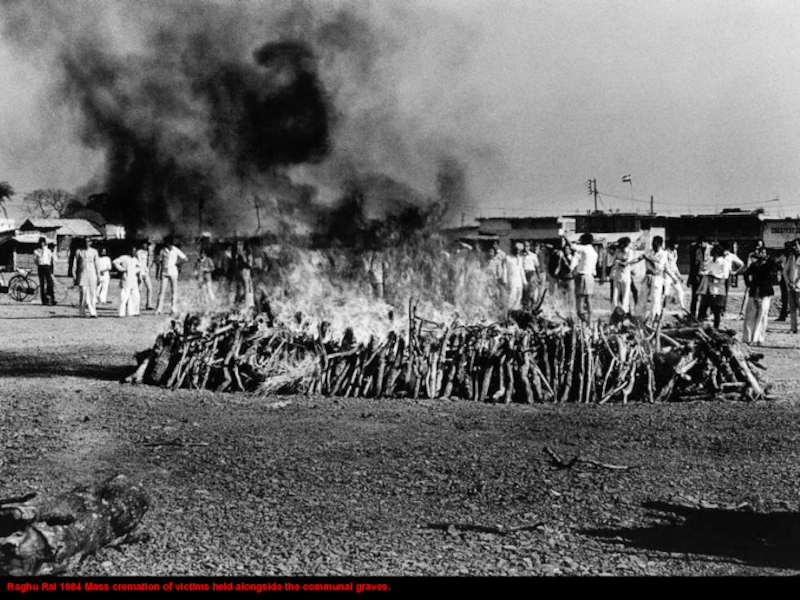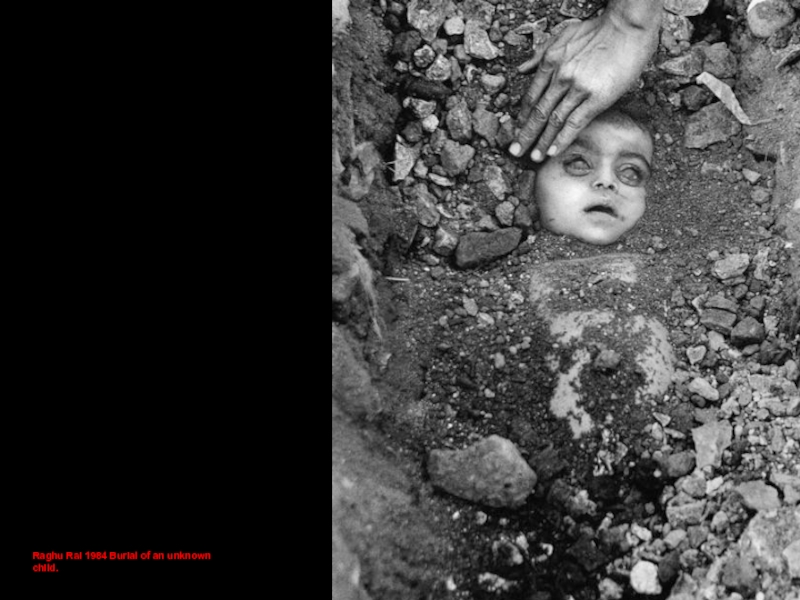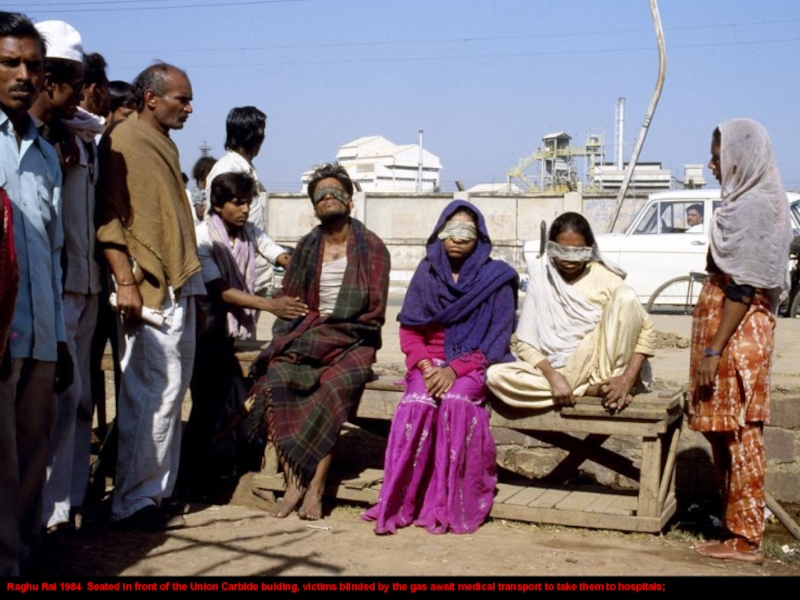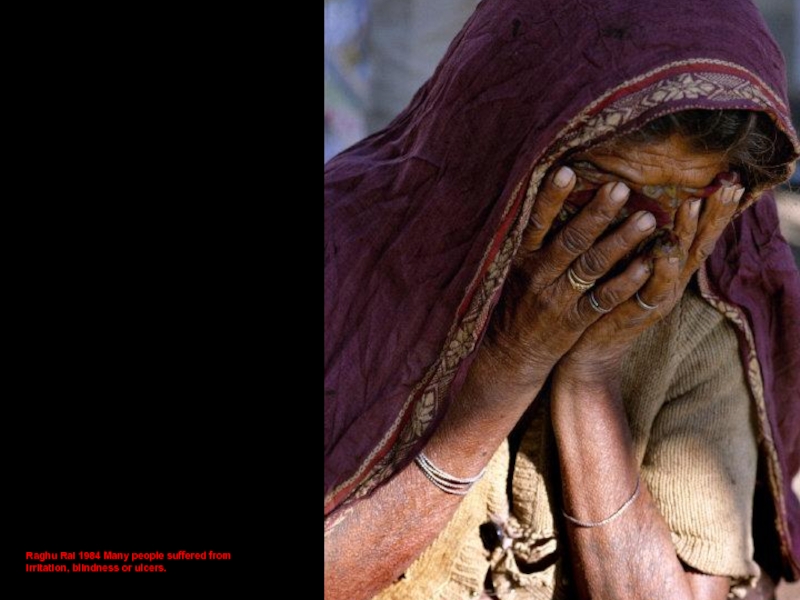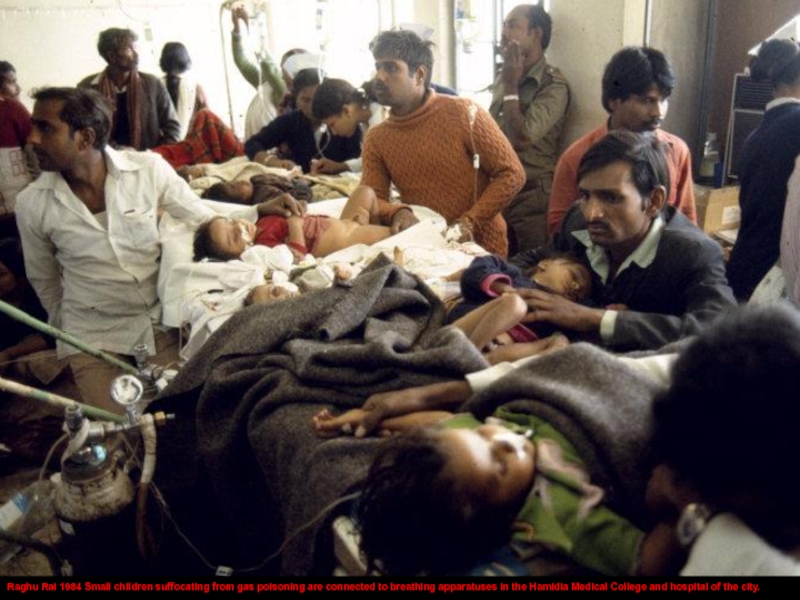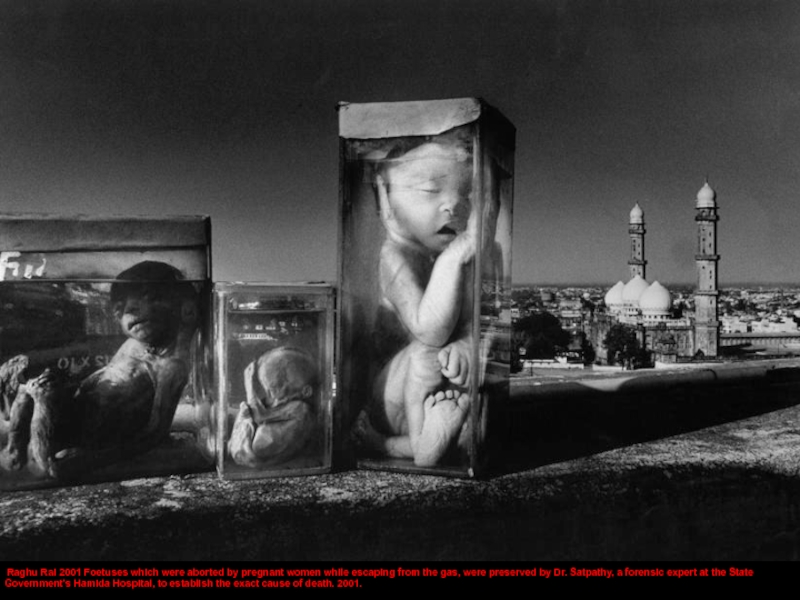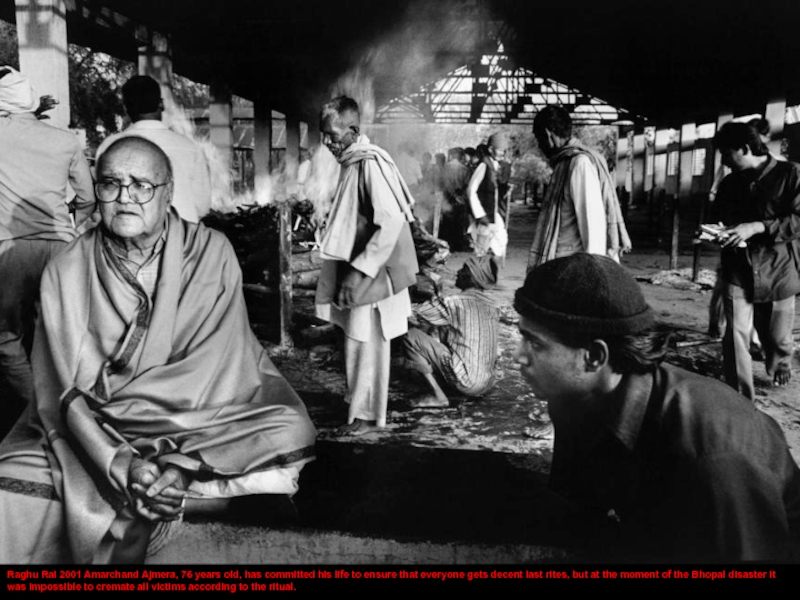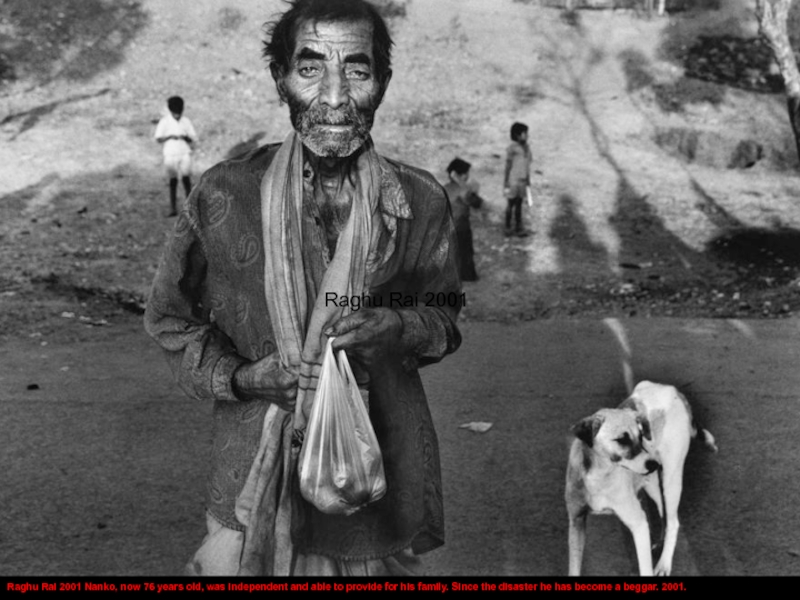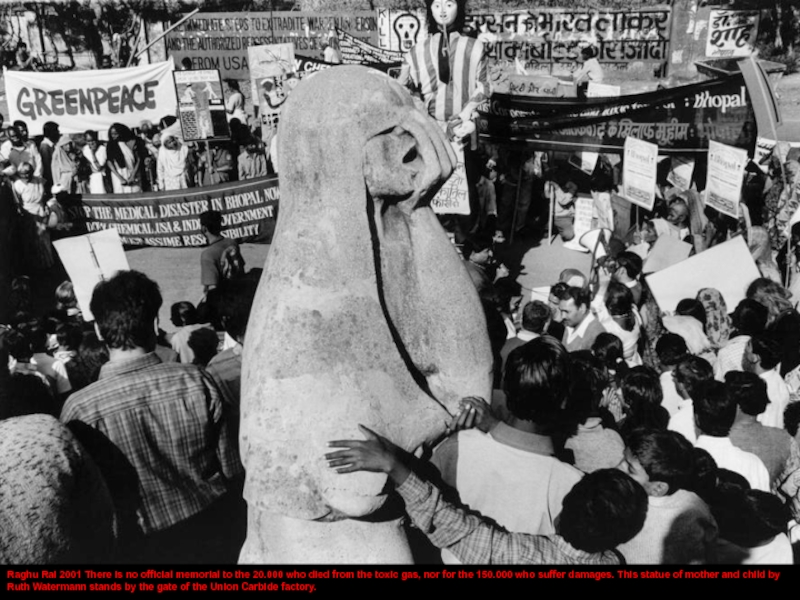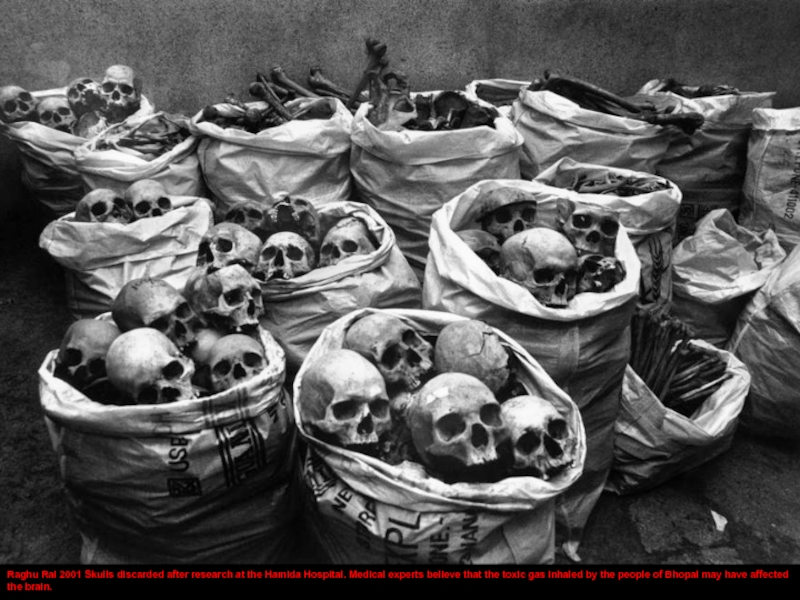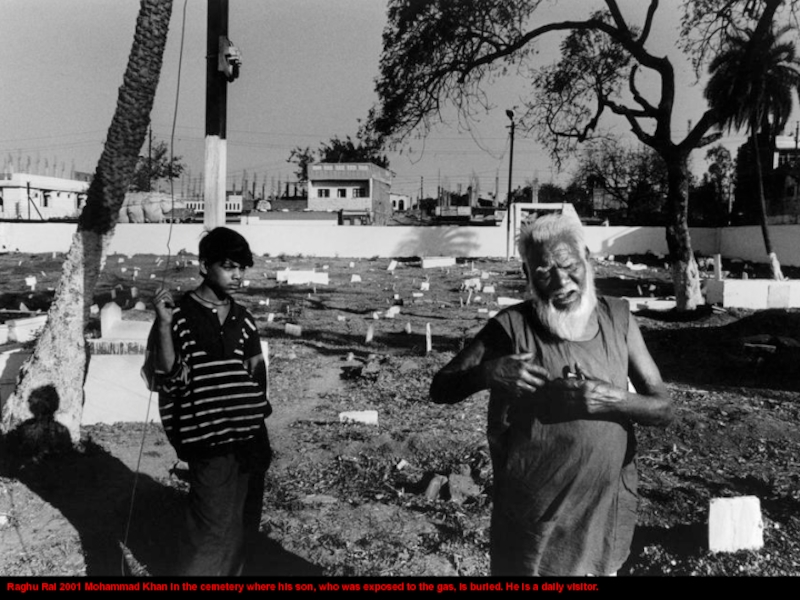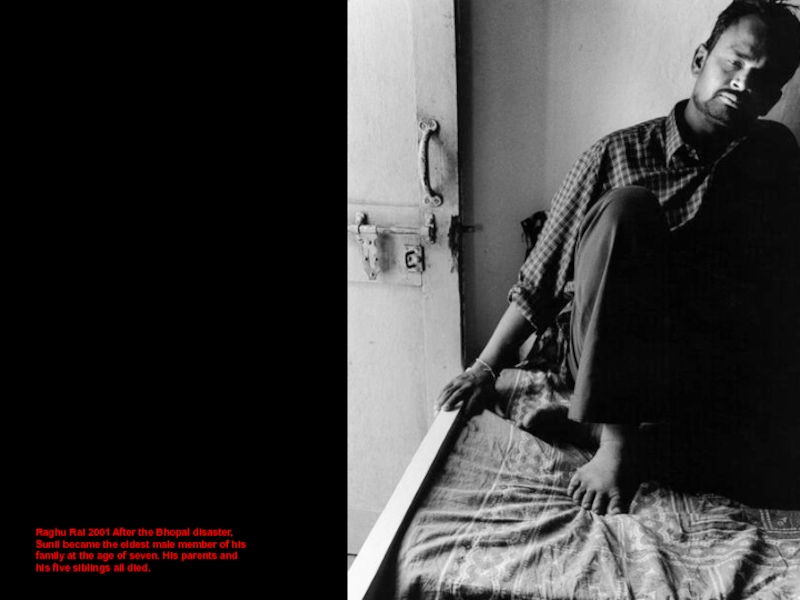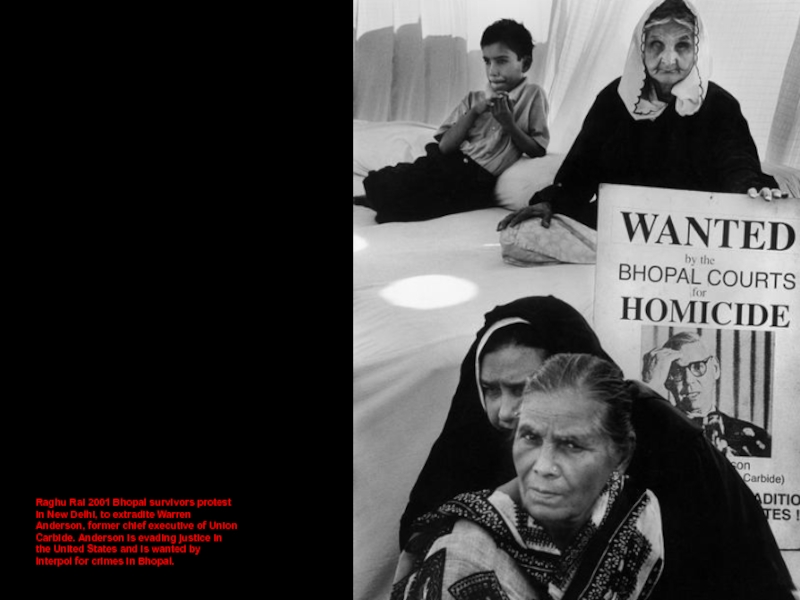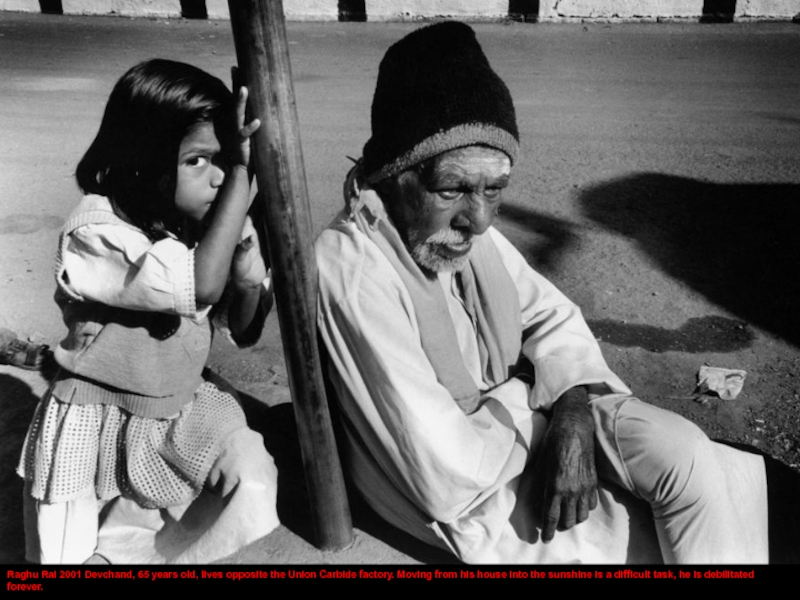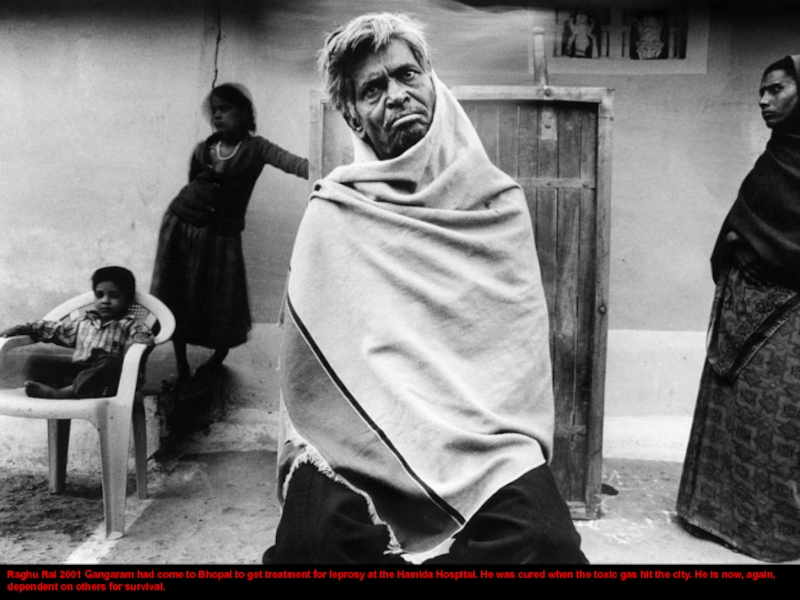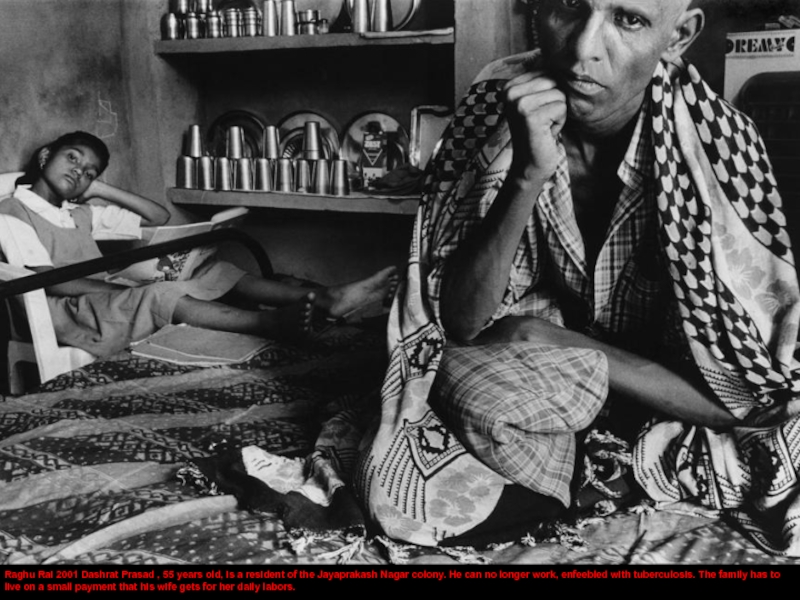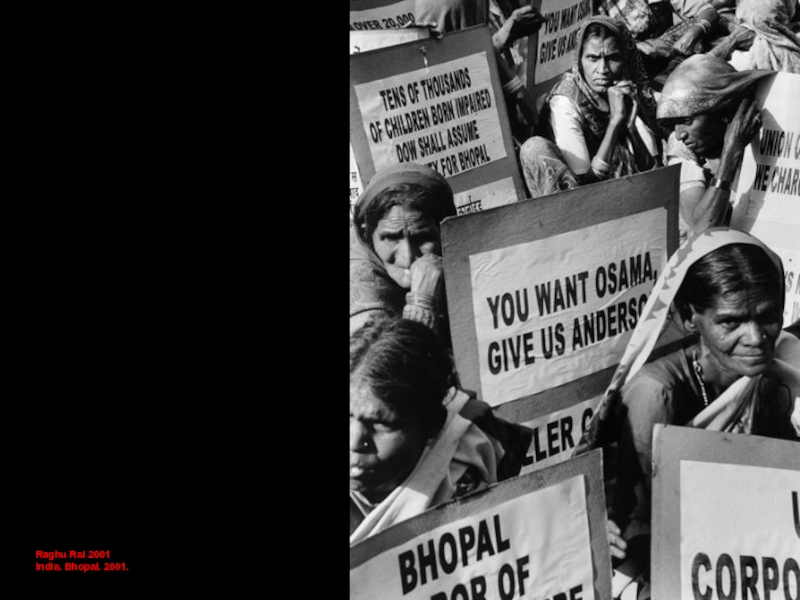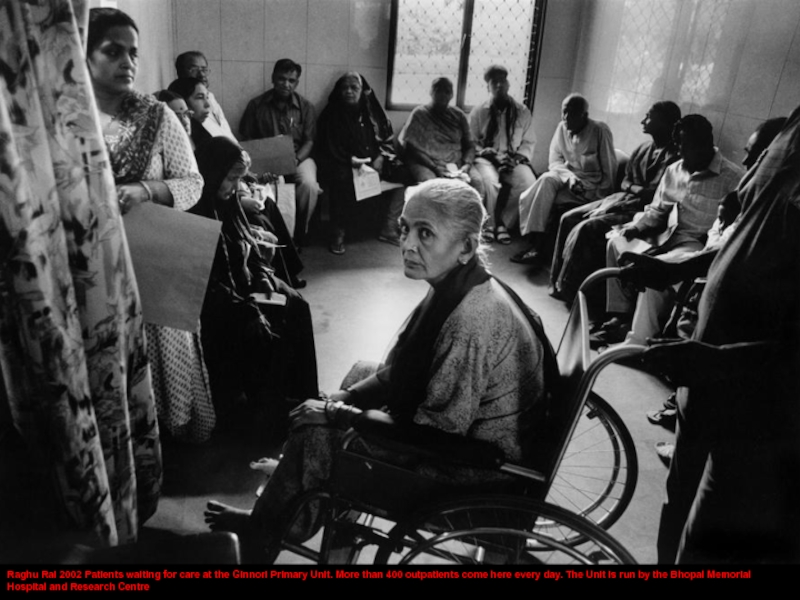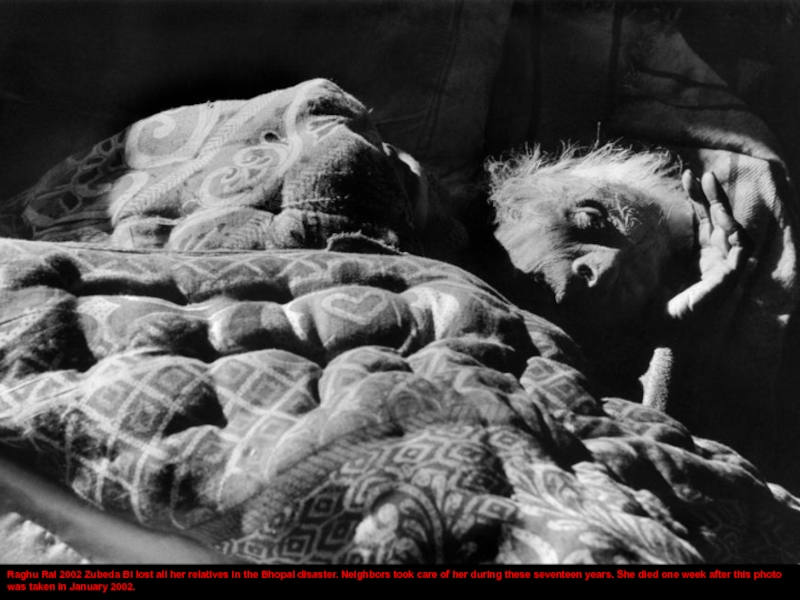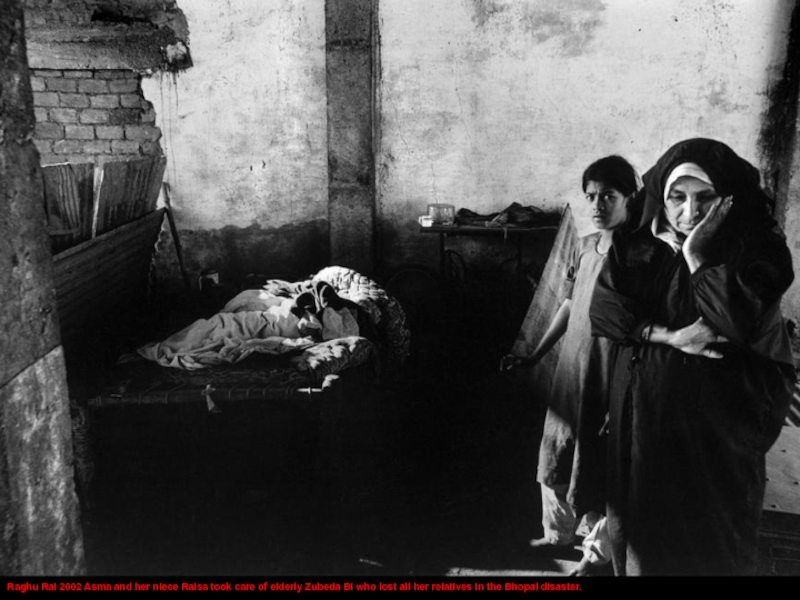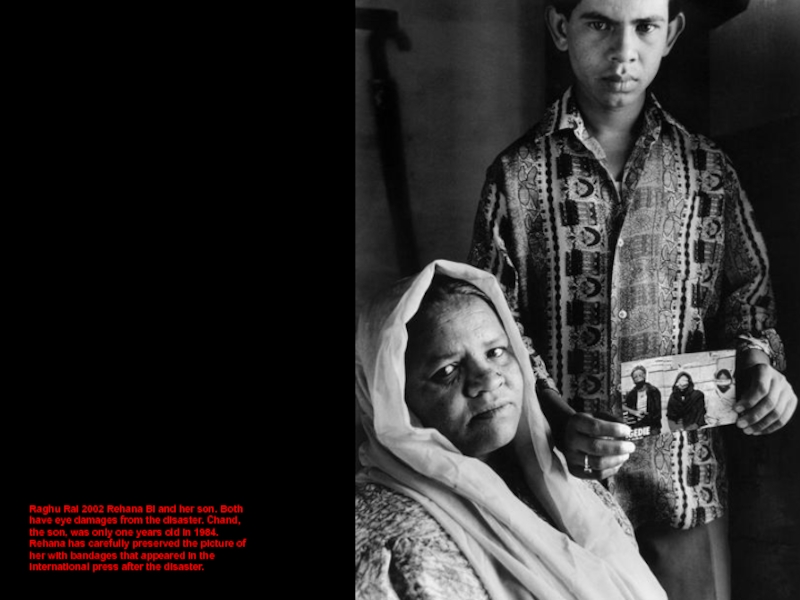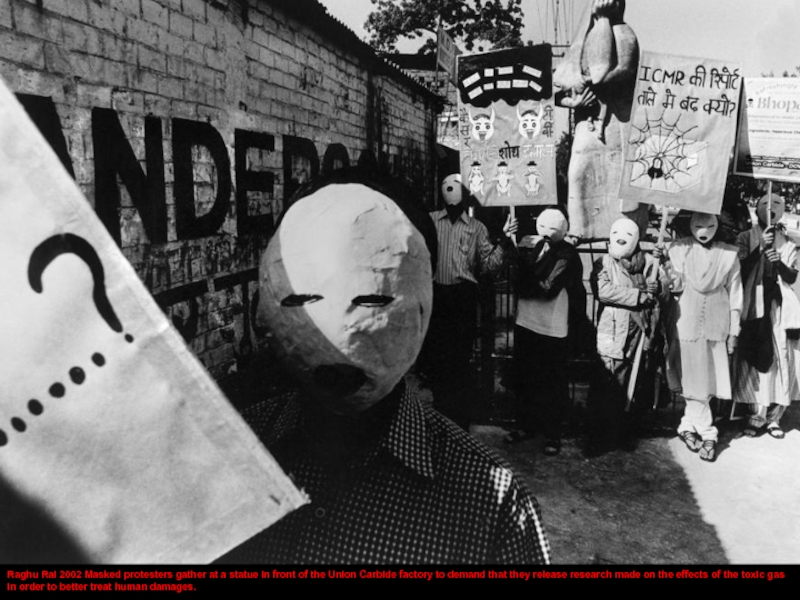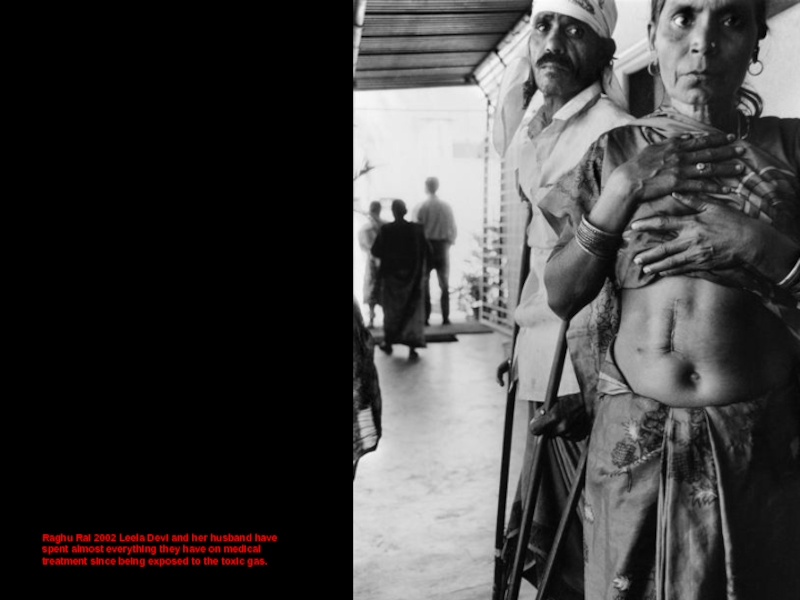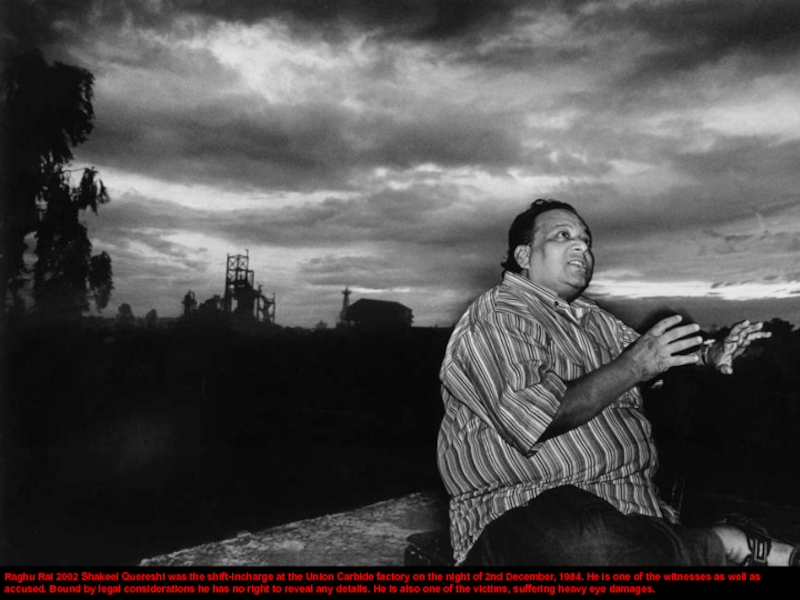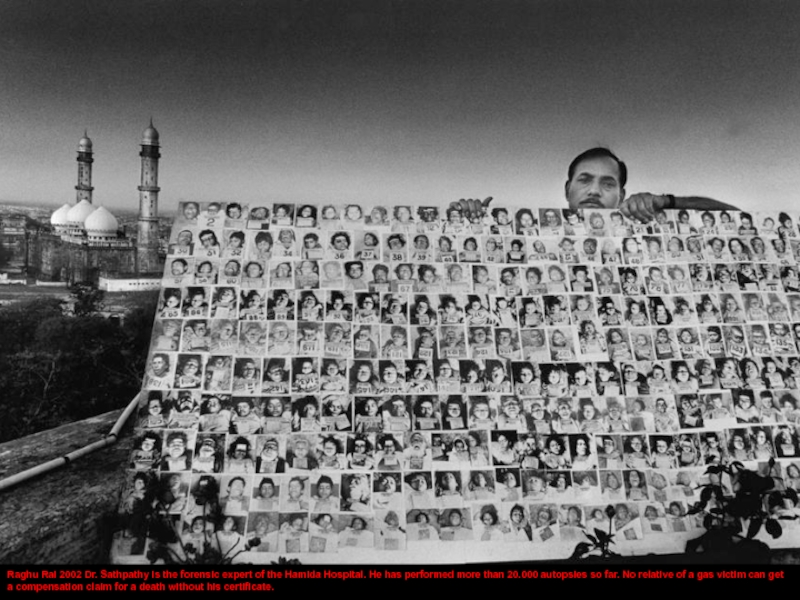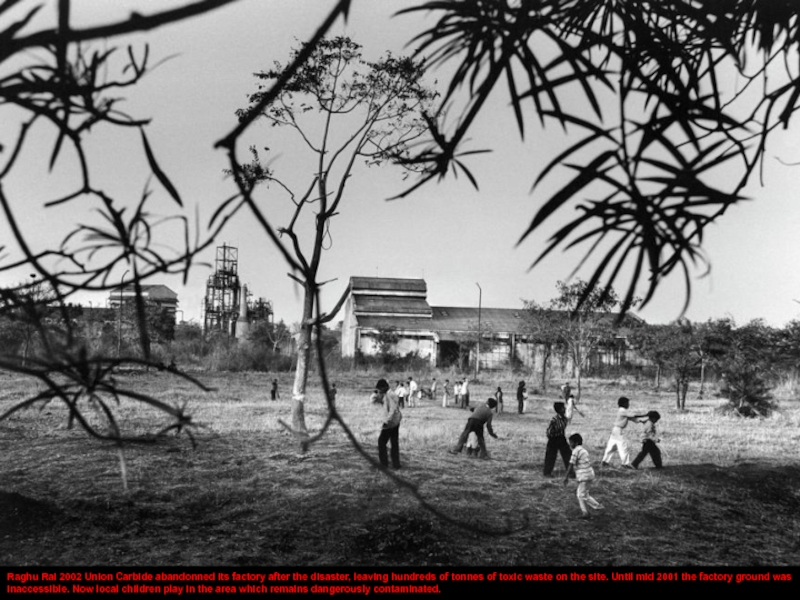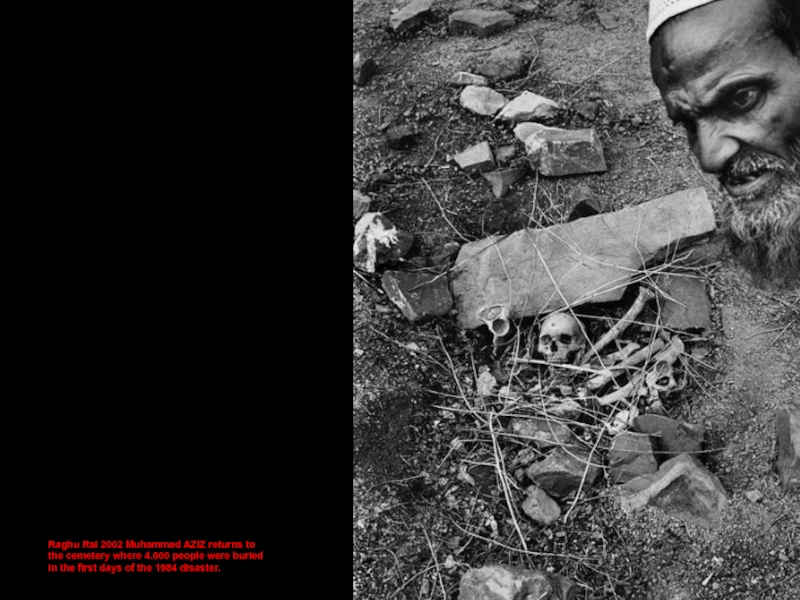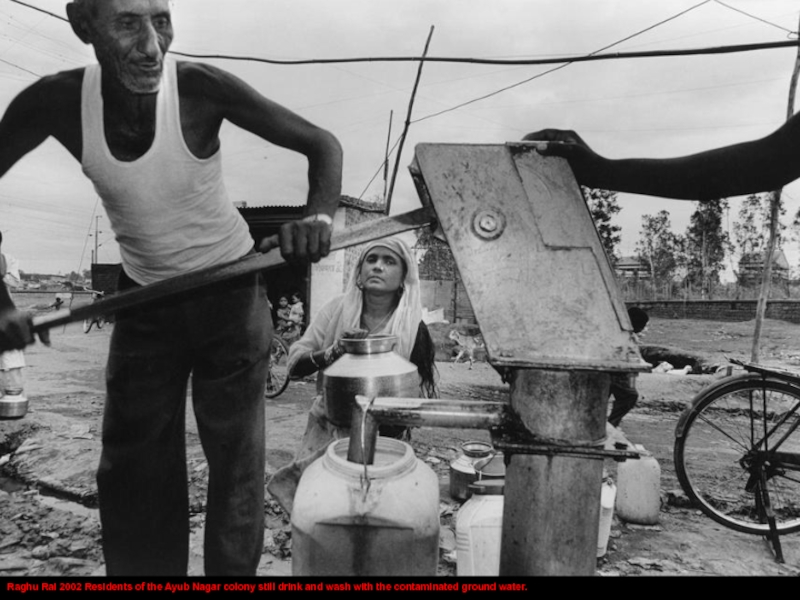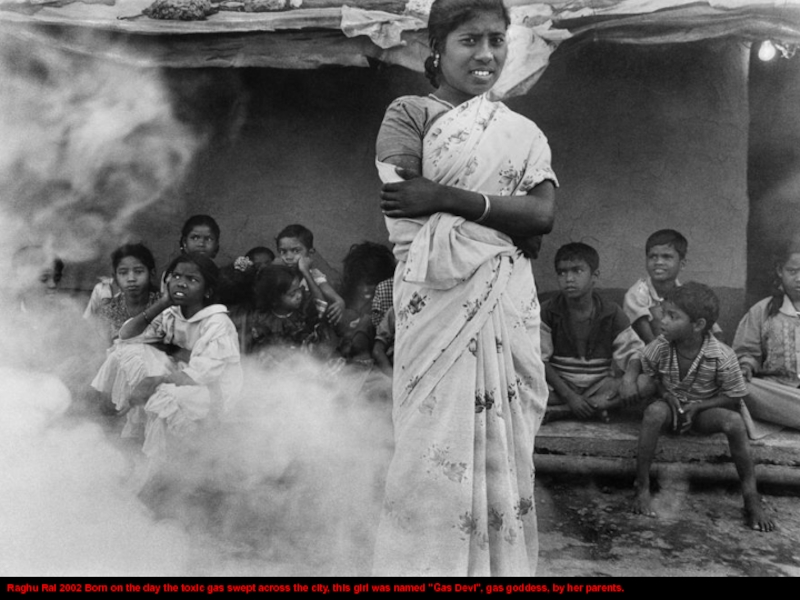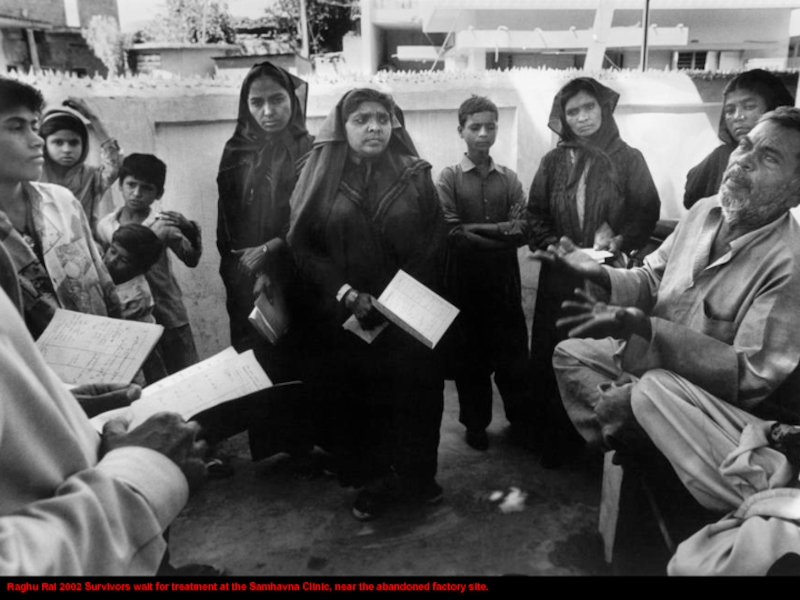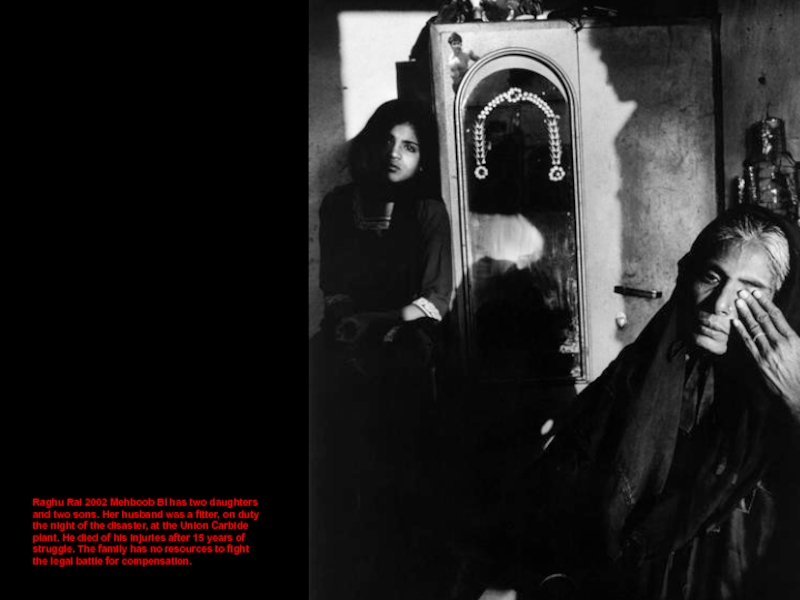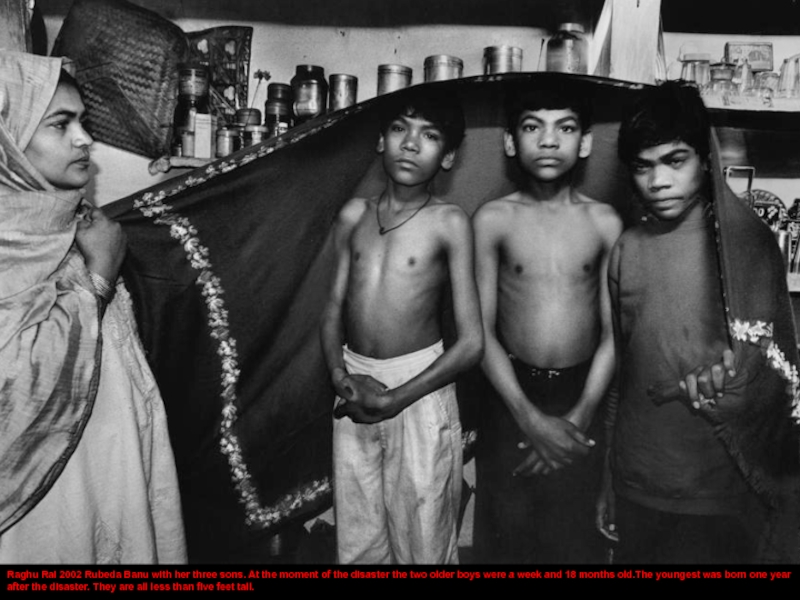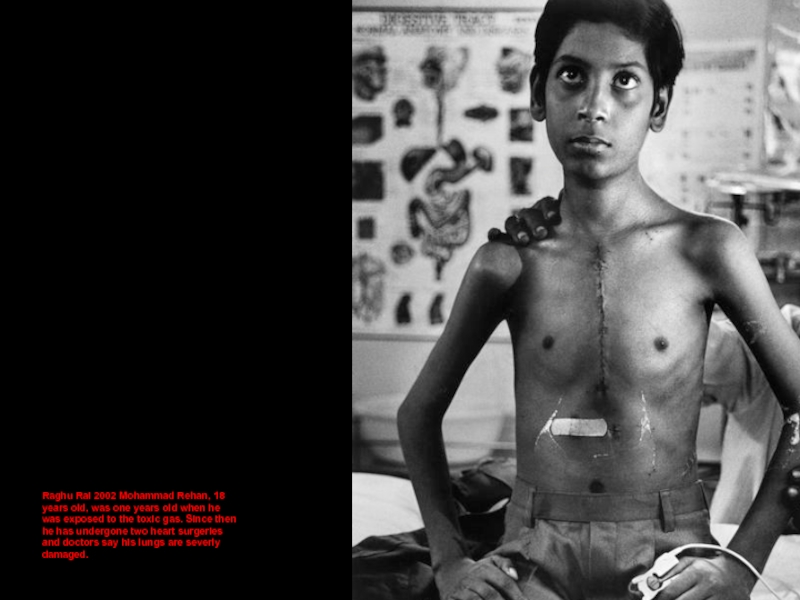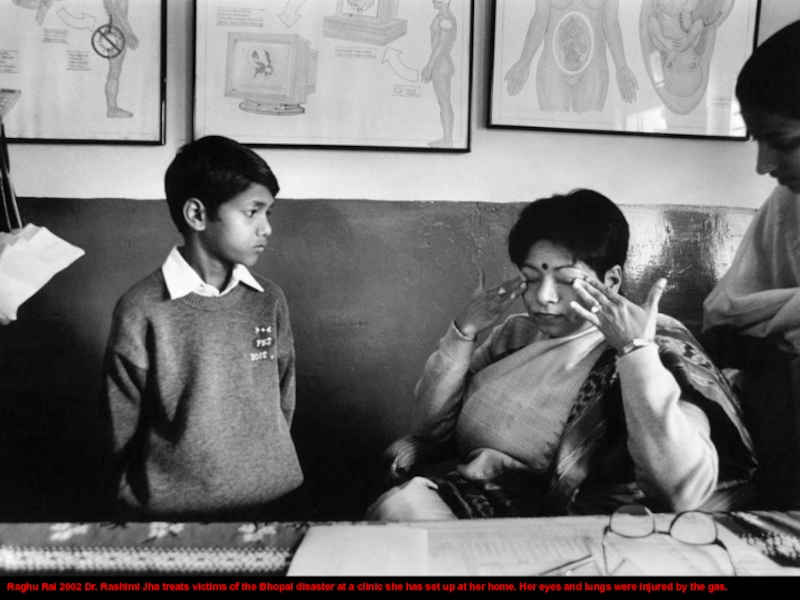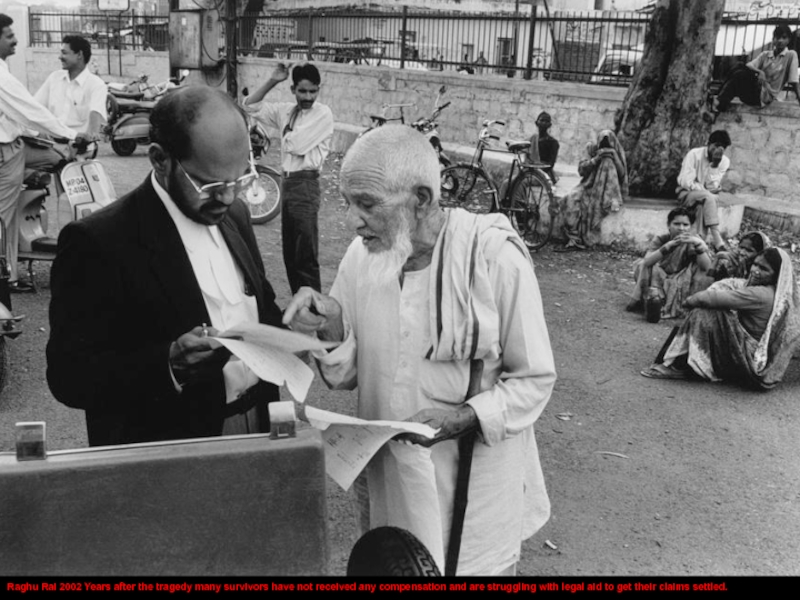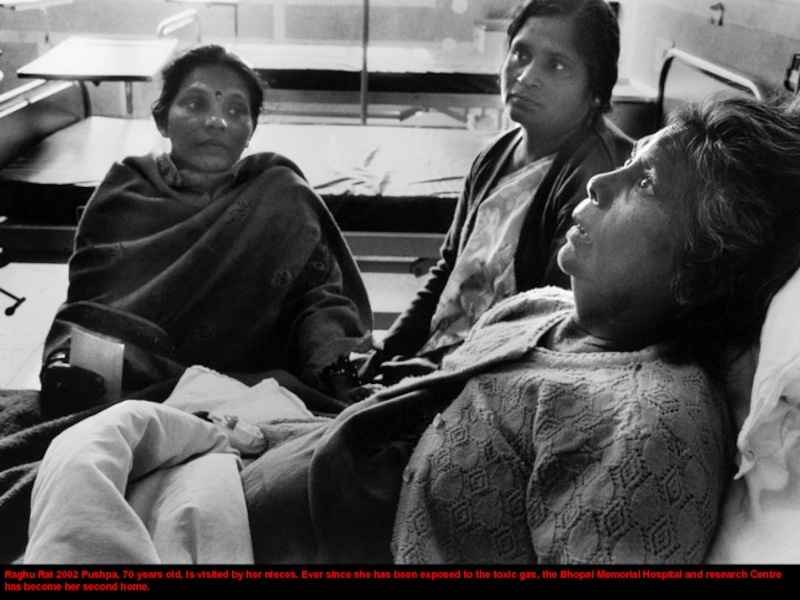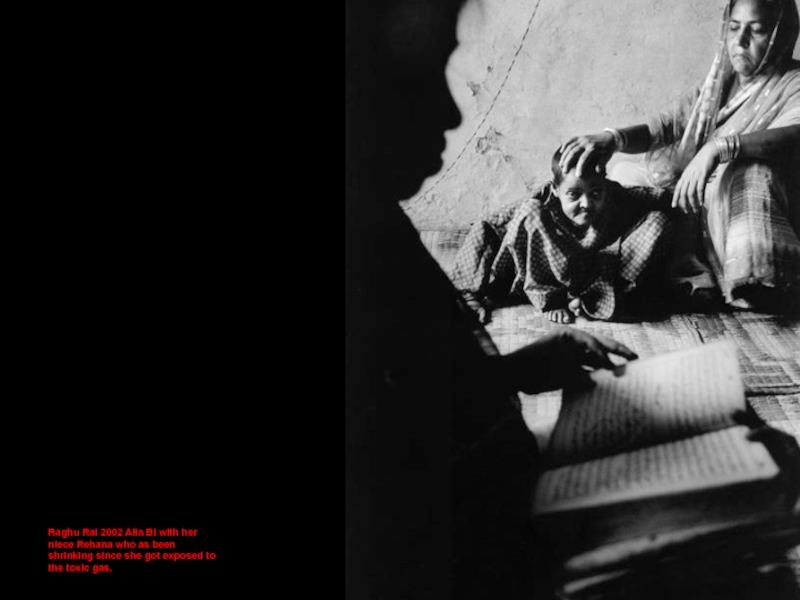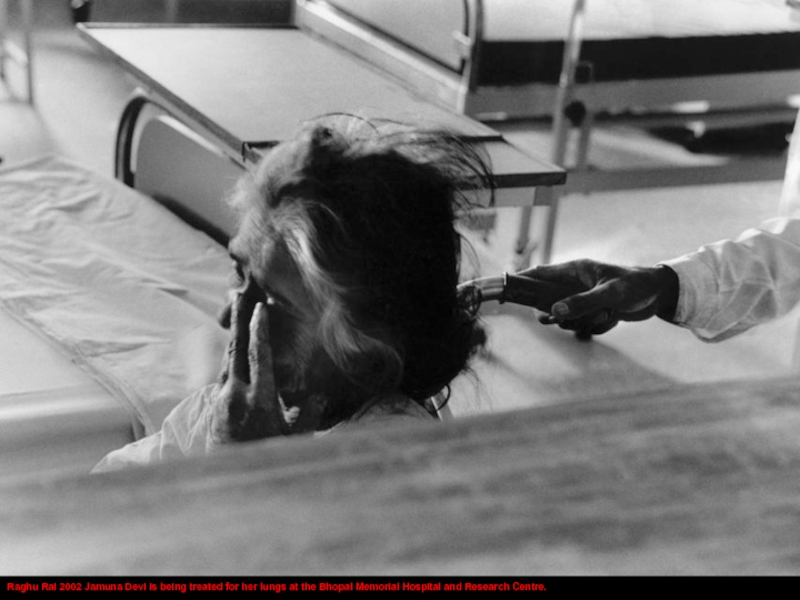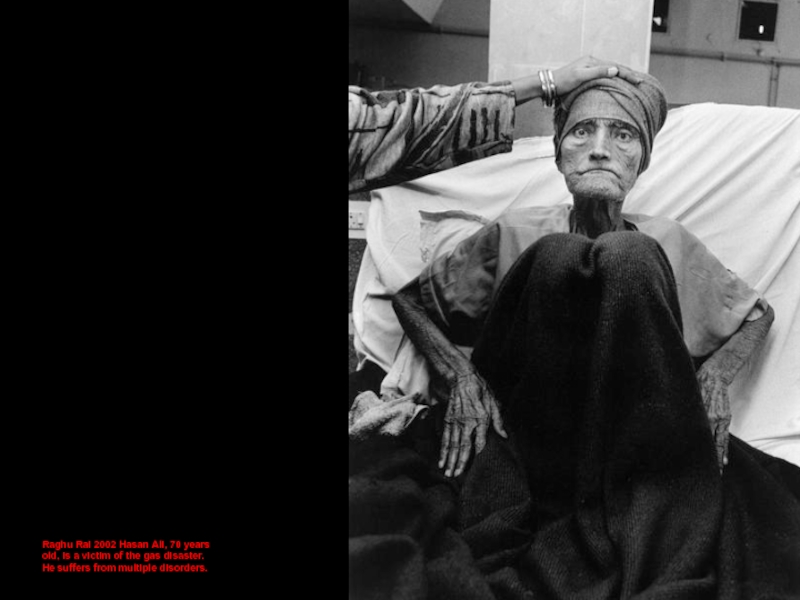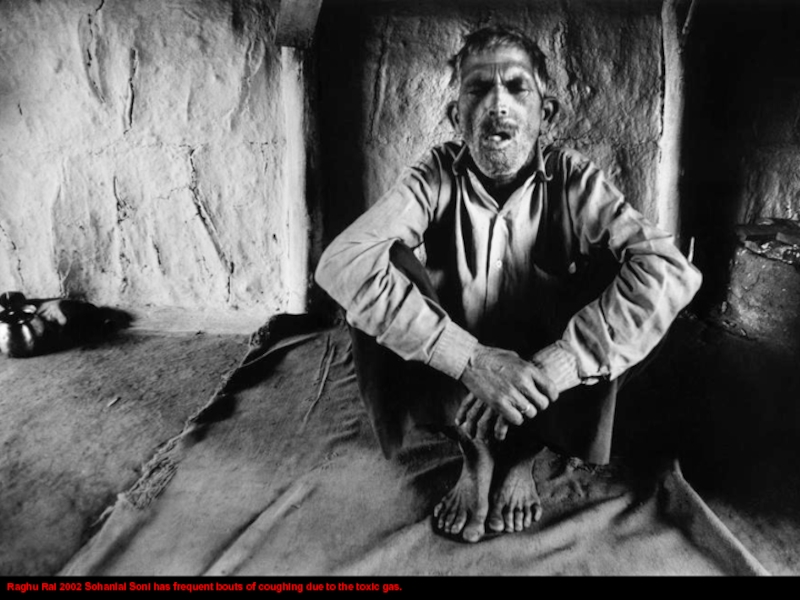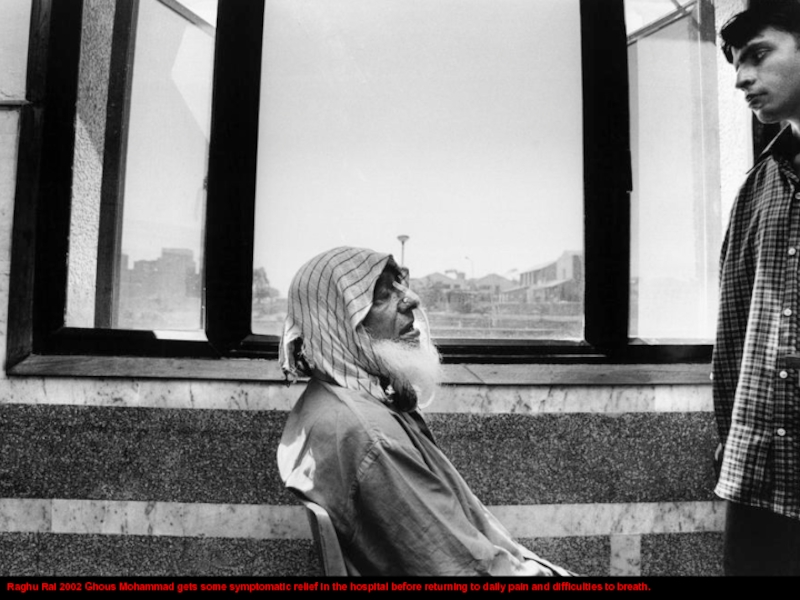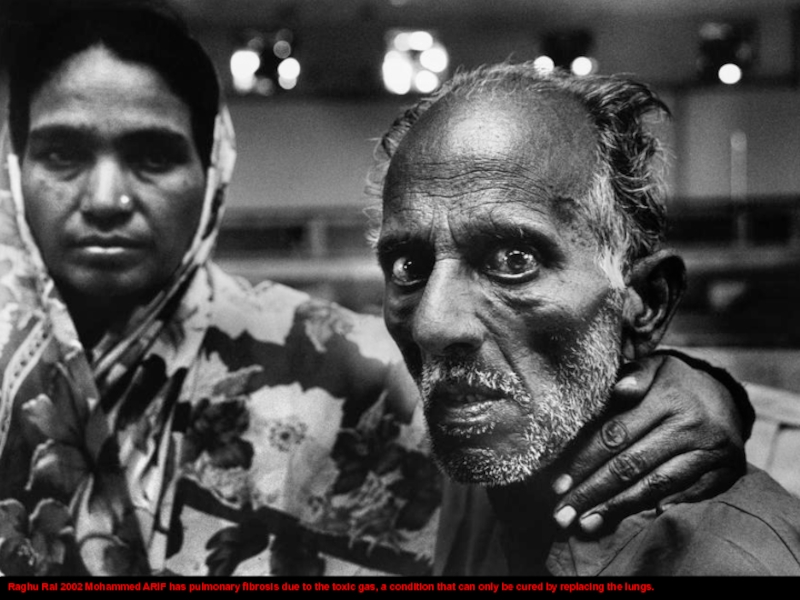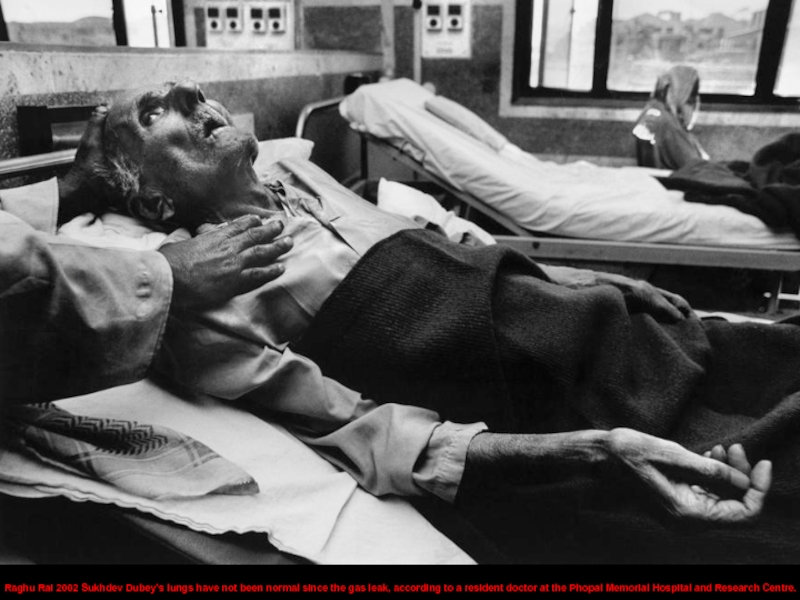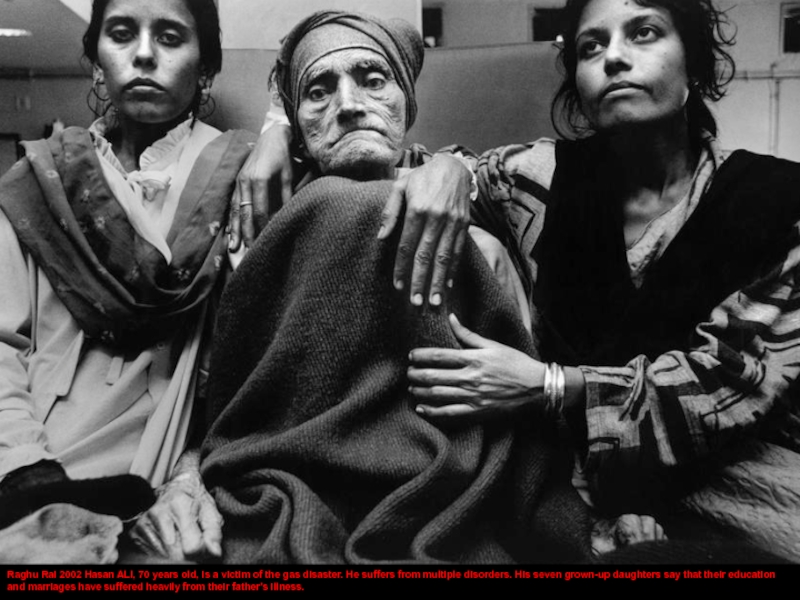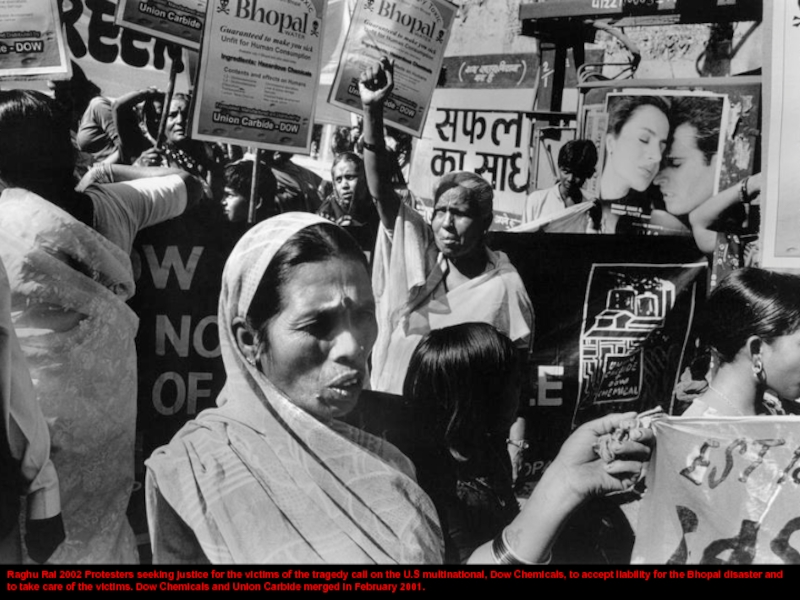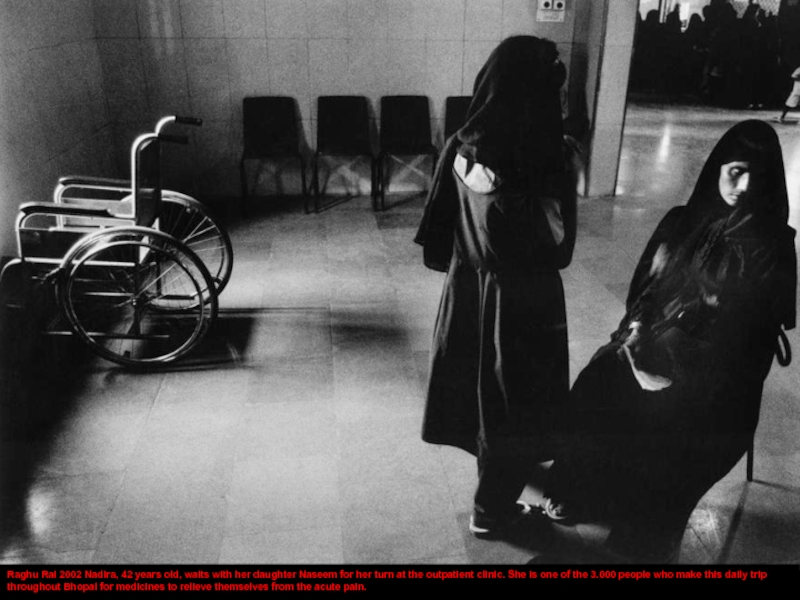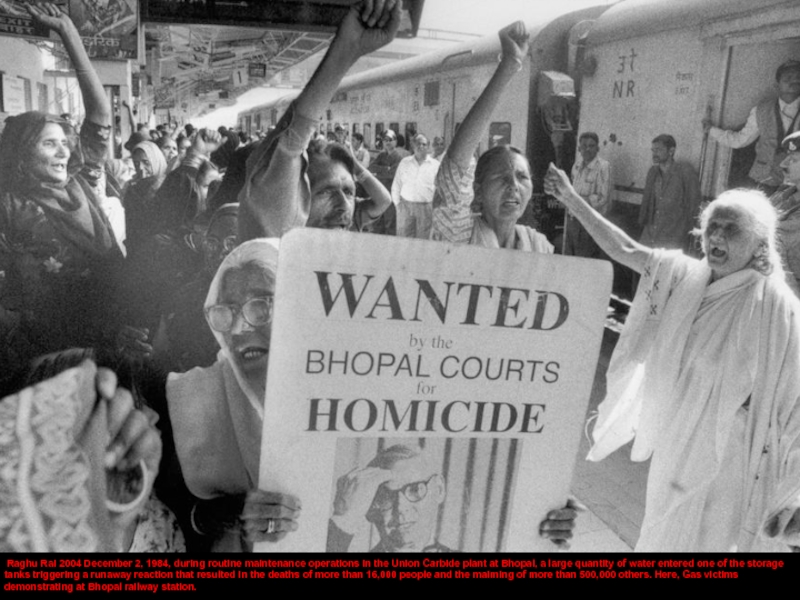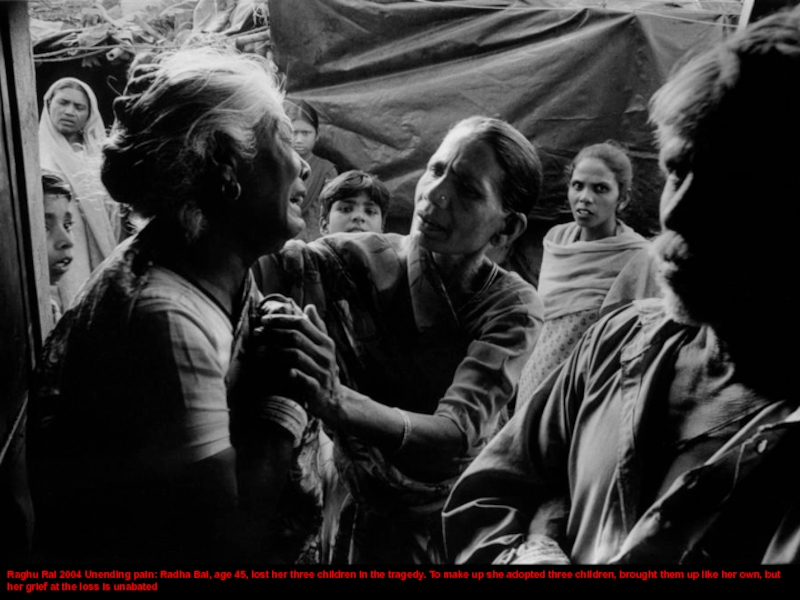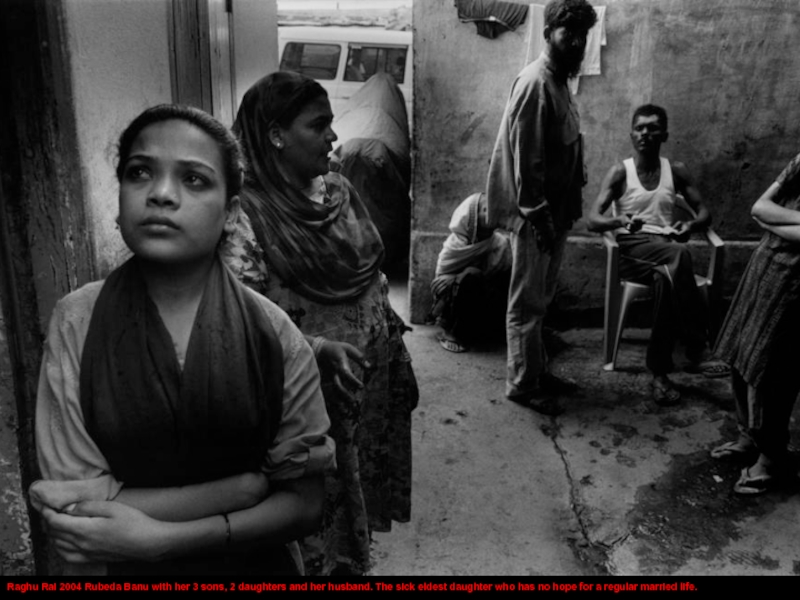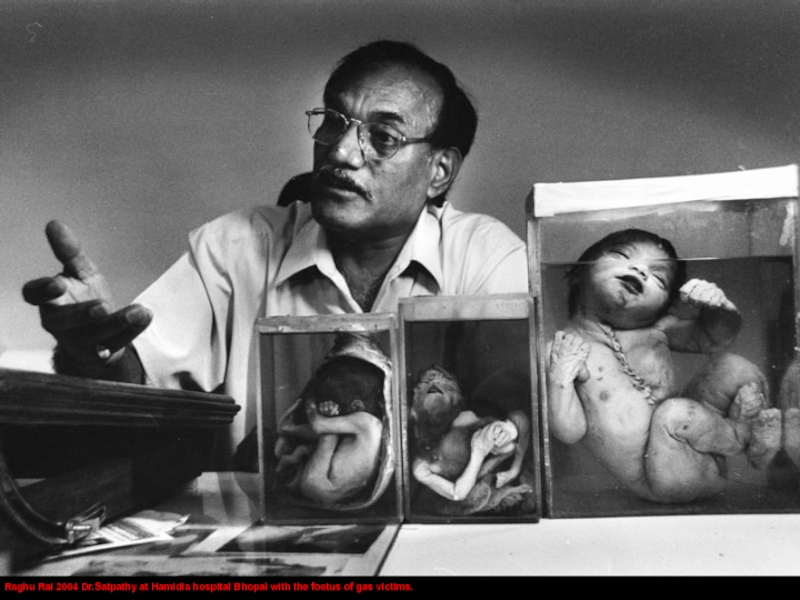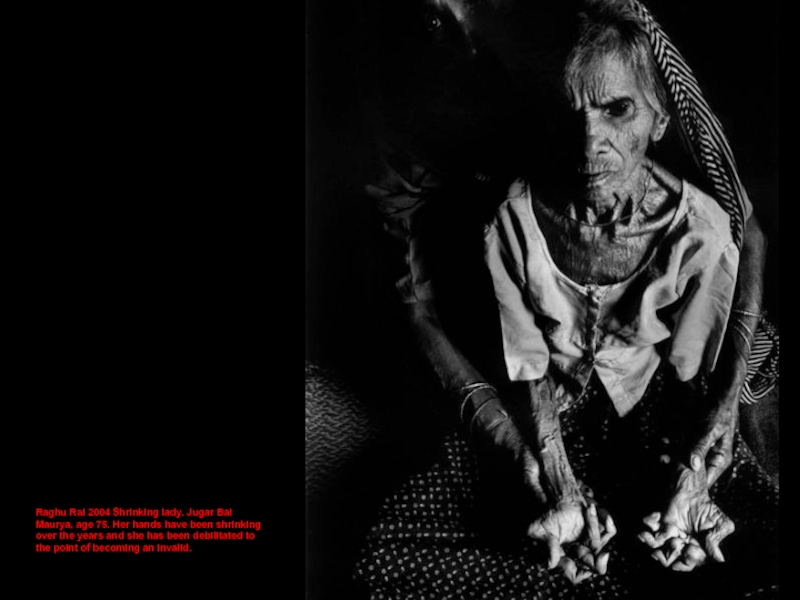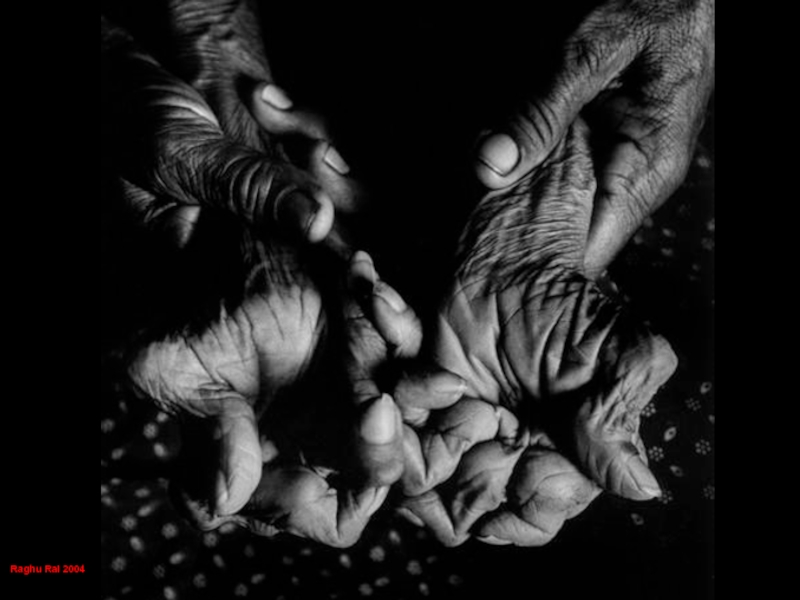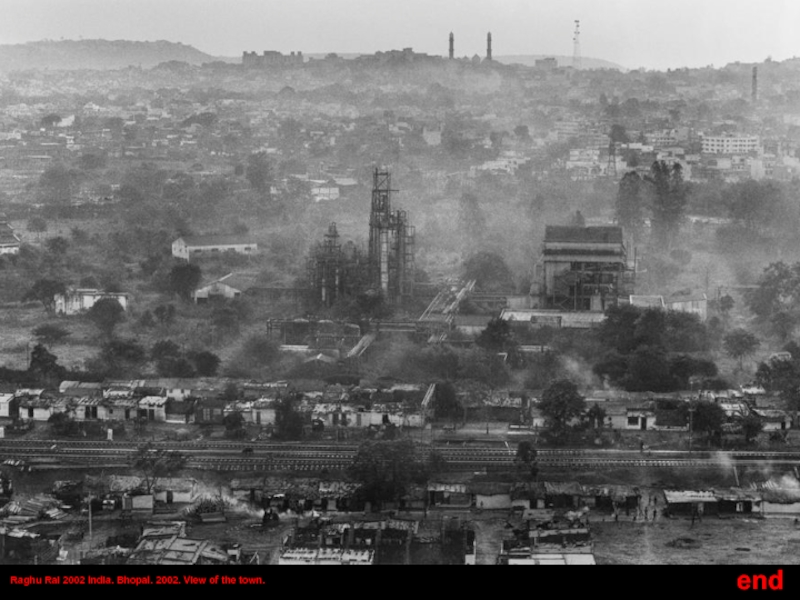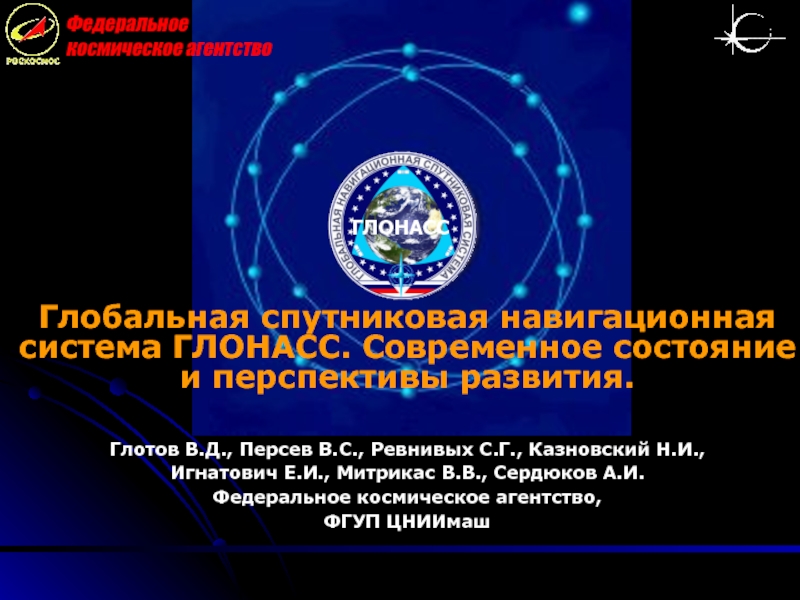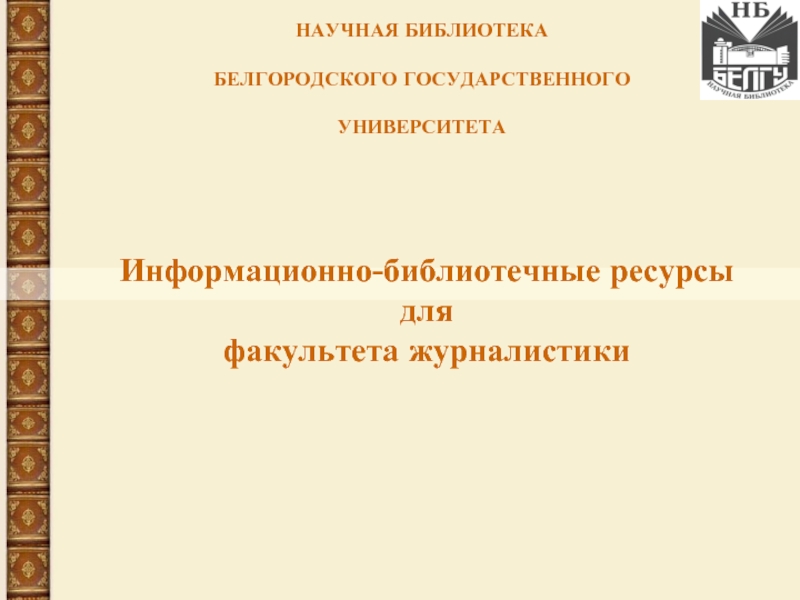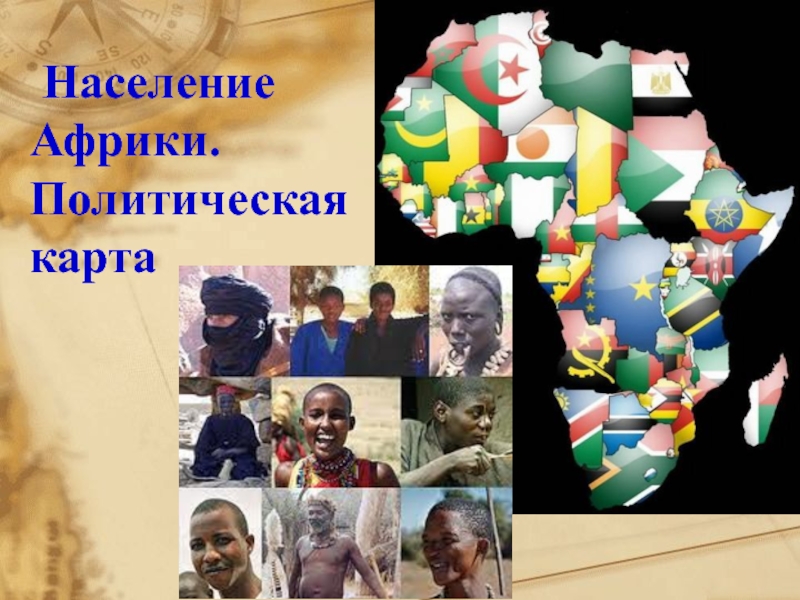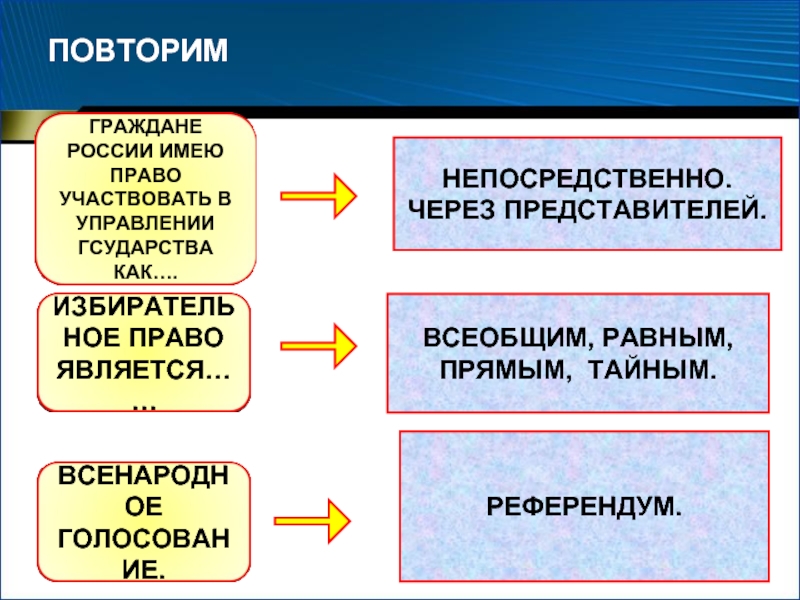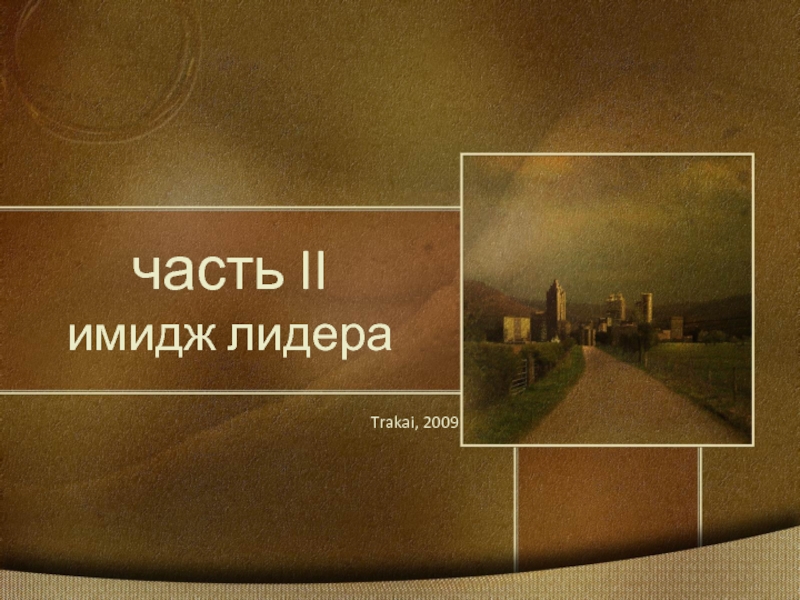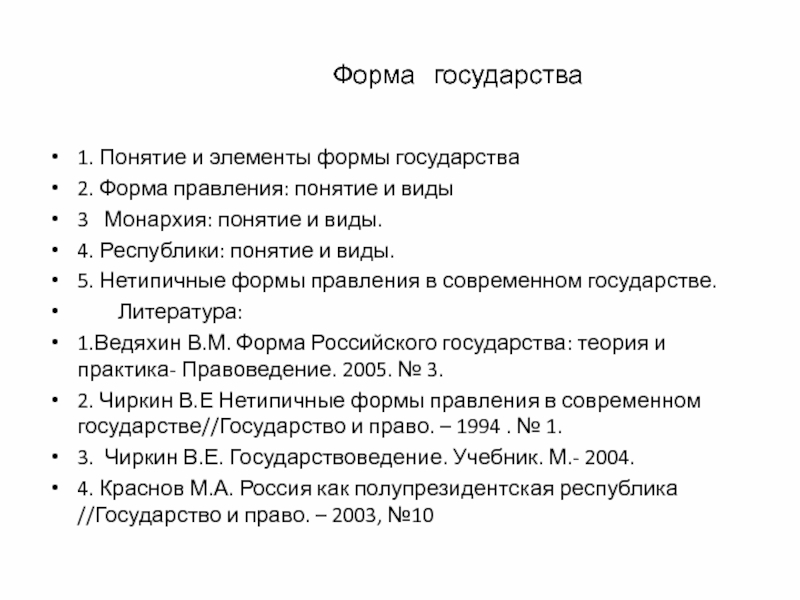since the worlds worst industrial accident when a toxic gas leak at the Union Carbide plant in Bhopal, India killed and maimed thousands of people.
- Главная
- Разное
- Дизайн
- Бизнес и предпринимательство
- Аналитика
- Образование
- Развлечения
- Красота и здоровье
- Финансы
- Государство
- Путешествия
- Спорт
- Недвижимость
- Армия
- Графика
- Культурология
- Еда и кулинария
- Лингвистика
- Английский язык
- Астрономия
- Алгебра
- Биология
- География
- Детские презентации
- Информатика
- История
- Литература
- Маркетинг
- Математика
- Медицина
- Менеджмент
- Музыка
- МХК
- Немецкий язык
- ОБЖ
- Обществознание
- Окружающий мир
- Педагогика
- Русский язык
- Технология
- Физика
- Философия
- Химия
- Шаблоны, картинки для презентаций
- Экология
- Экономика
- Юриспруденция
Portraits Of A Corporate Crime: Raghu Rai презентация
Содержание
- 3. Raghu Rai, Magnum Photos:
- 6. Bhopal: The World's Worst Industrial Disaster, 30
- 7. Toxic material remains, and 30 years later,
- 8. Raghu Rai 1984 This victim was identified
- 9. Raghu Rai 1984 Burial of unknown children, victims of the Bhopal disaster.
- 10. Raghu Rai 1984 A family suffering from serious eye and lung damage.
- 11. Raghu Rai 1984 This elderly woman was
- 12. Raghu Rai 1984 A man carries the body
- 13. Raghu Rai 1984 Poster of the dead and
- 14. Raghu Rai 1984 In the immediate aftermath of
- 15. Raghu Rai 1984 A man pastes identification labels onto dead children's foreheads before their cremation.
- 16. Raghu Rai 1984 Mass cremation of victims held alongside the communal graves.
- 17. Raghu Rai 1984 Burial of an unknown child.
- 18. Raghu Rai 1984 Seated in front of the
- 19. Raghu Rai 1984 Many people suffered from irritation, blindness or ulcers.
- 20. Raghu Rai 1984 Small children suffocating from gas
- 21. Raghu Rai 2001 Foetuses which were aborted by
- 22. Raghu Rai 2001 Amarchand Ajmera, 76 years old,
- 23. Raghu Rai 2001 Nanko, now 76 years old,
- 24. Raghu Rai 2001 There is no official memorial
- 25. Raghu Rai 2001 Skulls discarded after research at
- 26. Raghu Rai 2001 Mohammad Khan in the cemetery
- 27. Raghu Rai 2001 After the Bhopal disaster, Sunil
- 28. Raghu Rai 2001 Bhopal survivors protest in New
- 29. Raghu Rai 2001 Devchand, 65 years old, lives
- 30. Raghu Rai 2001 Gangaram had come to Bhopal
- 31. Raghu Rai 2001 Dashrat Prasad , 55 years
- 32. Raghu Rai 2001 India. Bhopal. 2001.
- 33. Raghu Rai 2002 Patients waiting for care at
- 34. Raghu Rai 2002 Zubeda Bi lost all her
- 35. Raghu Rai 2002 Asma and her niece Raisa
- 36. Raghu Rai 2002 Rehana Bi and her son.
- 37. Raghu Rai 2002 Masked protesters gather at a
- 38. Raghu Rai 2002 Jamela Bi and Shahejahan work
- 39. Raghu Rai 2002 Leela Devi and her husband
- 40. Raghu Rai 2002 Shakeel Quereshi was the shift-incharge
- 41. Raghu Rai 2002 Dr. Sathpathy is the forensic
- 42. Raghu Rai 2002 Union Carbide abandonned its factory
- 43. Raghu Rai 2002 Muhammed AZIZ returns to the
- 44. Raghu Rai 2002 Residents of the Ayub Nagar
- 45. Raghu Rai 2002 Born on the day the
- 46. Raghu Rai 2002 Survivors wait for treatment at
- 47. Raghu Rai 2002 Mehboob BI has two daughters
- 48. Raghu Rai 2002 Rubeda Banu with her three
- 49. Raghu Rai 2002 Mohammad Rehan, 18 years old,
- 50. Raghu Rai 2002 Dr. Rashimi Jha treats victims
- 51. Raghu Rai 2002 Years after the tragedy many
- 52. Raghu Rai 2002 Pushpa, 70 years old, is
- 53. Raghu Rai 2002 Alia Bi with her niece
- 54. Raghu Rai 2002 Jamuna Devi is being treated
- 55. Raghu Rai 2002 Hasan Ali, 70 years old,
- 56. Raghu Rai 2002 Sohanlal Soni has frequent bouts of coughing due to the toxic gas.
- 57. Raghu Rai 2002 Ghous Mohammad gets some symptomatic
- 58. Raghu Rai 2002 Mohammed ARIF has pulmonary fibrosis
- 59. Raghu Rai 2002 Sukhdev Dubey's lungs have not
- 60. Raghu Rai 2002 Hasan ALI, 70 years old,
- 61. Raghu Rai 2002 Protesters seeking justice for the
- 62. Raghu Rai 2002 Nadira, 42 years old, waits
- 63. Raghu Rai 2004 December 2, 1984, during routine
- 64. Raghu Rai 2004 Unending pain: Radha Bai, age
- 65. Raghu Rai 2004 Rubeda Banu with her 3
- 66. Raghu Rai 2004 Dr.Satpathy at Hamidia hospital Bhopal with the foetus of gas victims.
- 67. Raghu Rai 2004 Shrinking lady. Jugar Bai Maurya,
- 68. Raghu Rai 2004
- 69. Raghu Rai 2002 India. Bhopal. 2002. View of the town. end
- 70. cast
Слайд 6Bhopal: The World's Worst Industrial Disaster, 30 Years Later
Thirty years ago,
on the night of December 2, 1984, an accident at the Union Carbide pesticide plant in Bhopal, India, released at least 30 tons of a highly toxic gas called methyl isocyanate, as well as a number of other poisonous gases.
The pesticide plant was surrounded by shanty towns, leading to more than 600,000 people being exposed to the deadly gas cloud that night. The gases stayed low to the ground, causing victims throats and eyes to burn, inducing nausea, and many deaths.
Estimates of the death toll vary from as few as 3,800 to as many as 16,000, but government figures now refer to an estimate of 15,000 killed over the years.
The pesticide plant was surrounded by shanty towns, leading to more than 600,000 people being exposed to the deadly gas cloud that night. The gases stayed low to the ground, causing victims throats and eyes to burn, inducing nausea, and many deaths.
Estimates of the death toll vary from as few as 3,800 to as many as 16,000, but government figures now refer to an estimate of 15,000 killed over the years.
Слайд 7Toxic material remains, and 30 years later, many of those who
were exposed to the gas have given birth to physically and mentally disabled children.
For decades, survivors have been fighting to have the site cleaned up, but they say the efforts were slowed when Michigan-based Dow Chemical took over Union Carbide in 2001. Human rights groups say that thousands of tons of hazardous waste remain buried underground, and the government has conceded the area is contaminated.
There has, however, been no long-term epidemiological research which conclusively proves that birth defects are directly related to the drinking of the contaminated water.
For decades, survivors have been fighting to have the site cleaned up, but they say the efforts were slowed when Michigan-based Dow Chemical took over Union Carbide in 2001. Human rights groups say that thousands of tons of hazardous waste remain buried underground, and the government has conceded the area is contaminated.
There has, however, been no long-term epidemiological research which conclusively proves that birth defects are directly related to the drinking of the contaminated water.
Слайд 8
Raghu Rai 1984 This victim was identified as Leela who lived in
the Chola colony near the Union Carbide factory.
Слайд 11Raghu Rai 1984 This elderly woman was badly injured when exposed
to the poisonous gas. Everyone else in her family died.
Слайд 12Raghu Rai 1984 A man carries the body of his dead wife
past the deserted Union Carbide Factory, the source of the toxic gas that killed her the night before.
Слайд 13Raghu Rai 1984 Poster of the dead and missing displayed all over
Bhopal within days of the disaster. Many bodies were never identified.
Слайд 14Raghu Rai 1984 In the immediate aftermath of the disaster, thousands of
sick children were brought to the state government-run Hamida Hospital, their parents too ill to take care of them properly.
Слайд 15Raghu Rai 1984 A man pastes identification labels onto dead children's foreheads
before their cremation.
Слайд 18Raghu Rai 1984 Seated in front of the Union Carbide bulding, victims
blinded by the gas await medical transport to take them to hospitals;
Слайд 20Raghu Rai 1984 Small children suffocating from gas poisoning are connected to
breathing apparatuses in the Hamidia Medical College and hospital of the city.
Слайд 21 Raghu Rai 2001 Foetuses which were aborted by pregnant women while escaping
from the gas, were preserved by Dr. Satpathy, a forensic expert at the State Government's Hamida Hospital, to establish the exact cause of death. 2001.
Слайд 22Raghu Rai 2001 Amarchand Ajmera, 76 years old, has committed his life
to ensure that everyone gets decent last rites, but at the moment of the Bhopal disaster it was impossible to cremate all victims according to the ritual.
Слайд 23Raghu Rai 2001 Nanko, now 76 years old, was independent and able
to provide for his family. Since the disaster he has become a beggar. 2001.
Raghu Rai 2001
Слайд 24Raghu Rai 2001 There is no official memorial to the 20.000 who
died from the toxic gas, nor for the 150.000 who suffer damages. This statue of mother and child by Ruth Watermann stands by the gate of the Union Carbide factory.
Слайд 25Raghu Rai 2001 Skulls discarded after research at the Hamida Hospital. Medical
experts believe that the toxic gas inhaled by the people of Bhopal may have affected the brain.
Слайд 26Raghu Rai 2001 Mohammad Khan in the cemetery where his son, who
was exposed to the gas, is buried. He is a daily visitor.
Слайд 27Raghu Rai 2001 After the Bhopal disaster, Sunil became the eldest male
member of his family at the age of seven. His parents and his five siblings all died.
Слайд 28Raghu Rai 2001 Bhopal survivors protest in New Delhi, to extradite Warren
Anderson, former chief executive of Union Carbide. Anderson is evading justice in the United States and is wanted by Interpol for crimes in Bhopal.
Слайд 29Raghu Rai 2001 Devchand, 65 years old, lives opposite the Union Carbide
factory. Moving from his house into the sunshine is a difficult task, he is debilitated forever.
Слайд 30Raghu Rai 2001 Gangaram had come to Bhopal to get treatment for
leprosy at the Hamida Hospital. He was cured when the toxic gas hit the city. He is now, again, dependent on others for survival.
Слайд 31Raghu Rai 2001 Dashrat Prasad , 55 years old, is a resident
of the Jayaprakash Nagar colony. He can no longer work, enfeebled with tuberculosis. The family has to live on a small payment that his wife gets for her daily labors.
Слайд 33Raghu Rai 2002 Patients waiting for care at the Ginnori Primary Unit.
More than 400 outpatients come here every day. The Unit is run by the Bhopal Memorial Hospital and Research Centre
Слайд 34Raghu Rai 2002 Zubeda Bi lost all her relatives in the Bhopal
disaster. Neighbors took care of her during these seventeen years. She died one week after this photo was taken in January 2002.
Слайд 35Raghu Rai 2002 Asma and her niece Raisa took care of elderly
Zubeda Bi who lost all her relatives in the Bhopal disaster.
Слайд 36Raghu Rai 2002 Rehana Bi and her son. Both have eye damages
from the disaster. Chand, the son, was only one years old in 1984. Rehana has carefully preserved the picture of her with bandages that appeared in the international press after the disaster.
Слайд 37Raghu Rai 2002 Masked protesters gather at a statue in front of
the Union Carbide factory to demand that they release research made on the effects of the toxic gas in order to better treat human damages.
Слайд 38Raghu Rai 2002 Jamela Bi and Shahejahan work in a stationery centre
run for gas victims run by the state government. Neither is married. "No one wants to marry a sick gas-victim girl" says Aliya Bi.
Слайд 39Raghu Rai 2002 Leela Devi and her husband have spent almost everything
they have on medical treatment since being exposed to the toxic gas.
Слайд 40Raghu Rai 2002 Shakeel Quereshi was the shift-incharge at the Union Carbide
factory on the night of 2nd December, 1984. He is one of the witnesses as well as accused. Bound by legal considerations he has no right to reveal any details. He is also one of the victims, suffering heavy eye damages.
Слайд 41Raghu Rai 2002 Dr. Sathpathy is the forensic expert of the Hamida
Hospital. He has performed more than 20.000 autopsies so far. No relative of a gas victim can get a compensation claim for a death without his certificate.
Слайд 42Raghu Rai 2002 Union Carbide abandonned its factory after the disaster, leaving
hundreds of tonnes of toxic waste on the site. Until mid 2001 the factory ground was inaccessible. Now local children play in the area which remains dangerously contaminated.
Слайд 43Raghu Rai 2002 Muhammed AZIZ returns to the cemetery where 4.000 people
were buried in the first days of the 1984 disaster.
Слайд 44Raghu Rai 2002 Residents of the Ayub Nagar colony still drink and
wash with the contaminated ground water.
Слайд 45Raghu Rai 2002 Born on the day the toxic gas swept across
the city, this girl was named "Gas Devi", gas goddess, by her parents.
Слайд 46Raghu Rai 2002 Survivors wait for treatment at the Samhavna Clinic, near
the abandoned factory site.
Слайд 47Raghu Rai 2002 Mehboob BI has two daughters and two sons. Her
husband was a fitter, on duty the night of the disaster, at the Union Carbide plant. He died of his injuries after 15 years of struggle. The family has no resources to fight the legal battle for compensation.
Слайд 48Raghu Rai 2002 Rubeda Banu with her three sons. At the moment of
the disaster the two older boys were a week and 18 months old.The youngest was born one year after the disaster. They are all less than five feet tall.
Слайд 49Raghu Rai 2002 Mohammad Rehan, 18 years old, was one years old
when he was exposed to the toxic gas. Since then he has undergone two heart surgeries and doctors say his lungs are severly damaged.
Слайд 50Raghu Rai 2002 Dr. Rashimi Jha treats victims of the Bhopal disaster
at a clinic she has set up at her home. Her eyes and lungs were injured by the gas.
Слайд 51Raghu Rai 2002 Years after the tragedy many survivors have not received
any compensation and are struggling with legal aid to get their claims settled.
Слайд 52Raghu Rai 2002 Pushpa, 70 years old, is visited by her nieces.
Ever since she has been exposed to the toxic gas, the Bhopal Memorial Hospital and research Centre has become her second home.
Слайд 53Raghu Rai 2002 Alia Bi with her niece Rehana who as been
shrinking since she got exposed to the toxic gas.
Слайд 54Raghu Rai 2002 Jamuna Devi is being treated for her lungs at
the Bhopal Memorial Hospital and Research Centre.
Слайд 55Raghu Rai 2002 Hasan Ali, 70 years old, is a victim of
the gas disaster. He suffers from multiple disorders.
Слайд 57Raghu Rai 2002 Ghous Mohammad gets some symptomatic relief in the hospital
before returning to daily pain and difficulties to breath.
Слайд 58Raghu Rai 2002 Mohammed ARIF has pulmonary fibrosis due to the toxic
gas, a condition that can only be cured by replacing the lungs.
Слайд 59Raghu Rai 2002 Sukhdev Dubey's lungs have not been normal since the
gas leak, according to a resident doctor at the Phopal Memorial Hospital and Research Centre.
Слайд 60Raghu Rai 2002 Hasan ALI, 70 years old, is a victim of
the gas disaster. He suffers from multiple disorders. His seven grown-up daughters say that their education and marriages have suffered heavily from their father's illness.
Слайд 61Raghu Rai 2002 Protesters seeking justice for the victims of the tragedy
call on the U.S multinational, Dow Chemicals, to accept liability for the Bhopal disaster and to take care of the victims. Dow Chemicals and Union Carbide merged in February 2001.
Слайд 62Raghu Rai 2002 Nadira, 42 years old, waits with her daughter Naseem
for her turn at the outpatient clinic. She is one of the 3.000 people who make this daily trip throughout Bhopal for medicines to relieve themselves from the acute pain.
Слайд 63 Raghu Rai 2004 December 2, 1984, during routine maintenance operations in the
Union Carbide plant at Bhopal, a large quantity of water entered one of the storage tanks triggering a runaway reaction that resulted in the deaths of more than 16,000 people and the maiming of more than 500,000 others. Here, Gas victims demonstrating at Bhopal railway station.
Слайд 64Raghu Rai 2004 Unending pain: Radha Bai, age 45, lost her three
children in the tragedy. To make up she adopted three children, brought them up like her own, but her grief at the loss is unabated
Слайд 65Raghu Rai 2004 Rubeda Banu with her 3 sons, 2 daughters and
her husband. The sick eldest daughter who has no hope for a regular married life.
Слайд 67Raghu Rai 2004 Shrinking lady. Jugar Bai Maurya, age 75. Her hands
have been shrinking over the years and she has been debilitated to the point of becoming an invalid.
Слайд 70cast
Raghu Rai, Magnum Photos: Portrait Of A Corporate Crime
images and text credit www.
www.magnumphotos.com
www.elmundo.es
Music McIsaac
created olga.e. thanks for watching
www.magnumphotos.com
www.elmundo.es
Music McIsaac
created olga.e. thanks for watching
